闫文军 大学英语四级听力及词汇强化
- 格式:pdf
- 大小:1.13 MB
- 文档页数:45
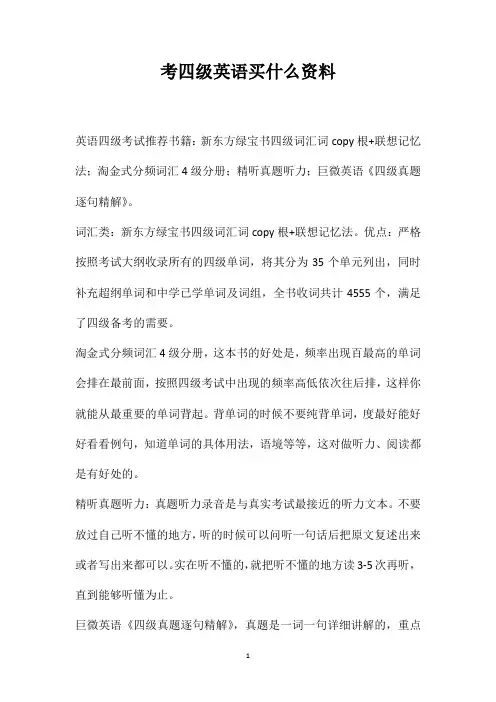
考四级英语买什么资料
英语四级考试推荐书籍:新东方绿宝书四级词汇词copy根+联想记忆法;淘金式分频词汇4级分册;精听真题听力;巨微英语《四级真题逐句精解》。
词汇类:新东方绿宝书四级词汇词copy根+联想记忆法。
优点:严格按照考试大纲收录所有的四级单词,将其分为35个单元列出,同时补充超纲单词和中学已学单词及词组,全书收词共计4555个,满足了四级备考的需要。
淘金式分频词汇4级分册,这本书的好处是,频率出现百最高的单词会排在最前面,按照四级考试中出现的频率高低依次往后排,这样你就能从最重要的单词背起。
背单词的时候不要纯背单词,度最好能好好看看例句,知道单词的具体用法,语境等等,这对做听力、阅读都是有好处的。
精听真题听力:真题听力录音是与真实考试最接近的听力文本。
不要放过自己听不懂的地方,听的时候可以问听一句话后把原文复述出来或者写出来都可以。
实在听不懂的,就把听不懂的地方读3-5次再听,直到能够听懂为止。
巨微英语《四级真题逐句精解》,真题是一词一句详细讲解的,重点
词汇都有释义,每一个句子也都有语法答解析,尤其是长难句,还有语法图解,特别适合英语基础比较薄弱的同学用。
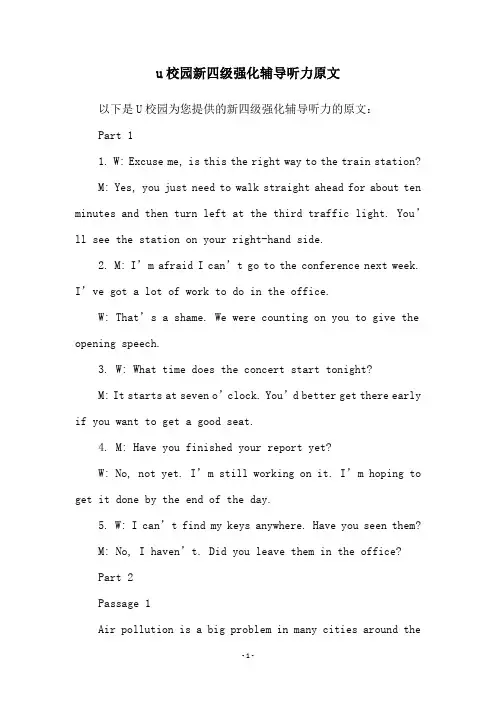
u校园新四级强化辅导听力原文以下是U校园为您提供的新四级强化辅导听力的原文:Part 11. W: Excuse me, is this the right way to the train station? M: Yes, you just need to walk straight ahead for about ten minutes and then turn left at the third traffic light. You’ll see the station on your right-hand side.2. M: I’m afraid I can’t go to the conference next week. I’ve got a lot of work to do in the office.W: That’s a shame. We were counting on you to give the opening speech.3. W: What time does the concert start tonight?M: It starts at seven o’clock. You’d better get there early if you want to get a good seat.4. M: Have you finished your report yet?W: No, not yet. I’m still working on it. I’m hoping to get it done by the end of the day.5. W: I can’t find my keys anywhere. Have you seen them? M: No, I haven’t. Did you leave them in the office?Part 2Passage 1Air pollution is a big problem in many cities around theworld. It is caused by many different things, such as cars, factories and even natural disasters like dust storms. Pollution can cause many health problems, such as respiratory diseases, heart problems and even cancer. Governments need to take measures to reduce pollution, such as encouraging people to use public transportation instead of cars and creating laws to limit the amount of pollution that factories can produce. Passage 2One of the most important inventions in history is the printing press, which was invented by Johannes Gutenberg in the 15th century. Before the printing press, books had to be copied by hand, which was a very slow and expensive process. The printing press made it possible to produce books more quickly and cheaply, which made books more available to people. This led to an increase in literacy and a spread of knowledge and ideas, which had a profound impact on society.Passage 3The Internet has changed the way we live our lives in many ways. It has made it easier for people to communicate with each other, no matter where they are in the world. It has also made it easier to access information on almost any topic, from news to entertainment to education. However, there are also somedrawbacks to the Internet, such as cyberbullying, online addiction and privacy concerns. It is important for people to use the Internet responsibly and to be aware of its potential dangers.Part 31. M: What do you like to do in your free time?W: I love playing video games. It’s a great way to relax and unwind.2. W: What kind of music do you like?M: I like all kinds of music, but I’m really into jazz and blues.3. M: Have you decided where you want to go on vacation this year?W: Yes, I’m thinking about going to Europe. I’ve always wanted to visit Italy and France.4. W: Do you have any plans for this weekend?M: Yes, I’m going to a concert with some friends. It should be a lot of fun.5. M: What do you think about the situation in the Middle East?W: I think it’s very complicated. There are a lot of different groups involved and it’s hard to know who’s rightand who’s wrong.。
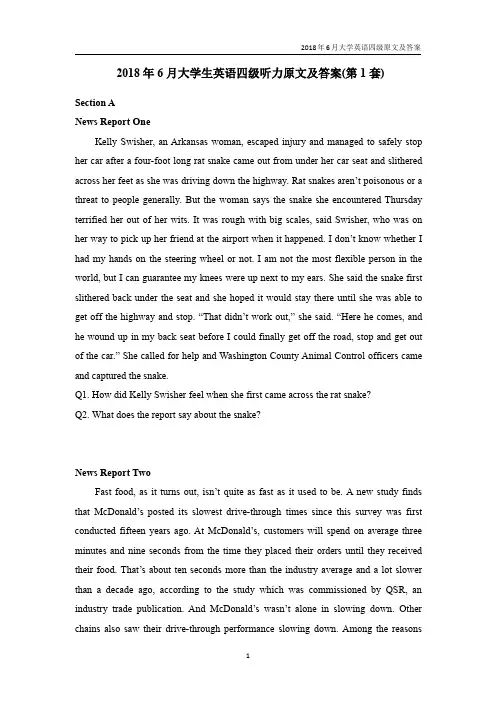
2018年6月大学生英语四级听力原文及答案(第1套)Section ANews Report OneKelly Swisher,an Arkansas woman,escaped injury and managed to safely stop her car after a four-foot long rat snake came out from under her car seat and slithered across her feet as she was driving down the highway.Rat snakes aren’t poisonous or a threat to people generally.But the woman says the snake she encountered Thursday terrified her out of her wits.It was rough with big scales,said Swisher,who was on her way to pick up her friend at the airport when it happened.I don’t know whether I had my hands on the steering wheel or not.I am not the most flexible person in the world,but I can guarantee my knees were up next to my ears.She said the snake first slithered back under the seat and she hoped it would stay there until she was able to get off the highway and stop.“That didn’t work out,”she said.“Here he comes,and he wound up in my back seat before I could finally get off the road,stop and get out of the car.”She called for help and Washington County Animal Control officers came and captured the snake.Q1.How did Kelly Swisher feel when she first came across the rat snake?Q2.What does the report say about the snake?News Report TwoFast food,as it turns out,isn’t quite as fast as it used to be.A new study finds that McDonald’s posted its slowest drive-through times since this survey was first conducted fifteen years ago.At McDonald’s,customers will spend on average three minutes and nine seconds from the time they placed their orders until they received their food.That’s about ten seconds more than the industry average and a lot slower than a decade ago,according to the study which was commissioned by QSR,an industry trade publication.And McDonald’s wasn’t alone in slowing down.Other chains also saw their drive-through performance slowing down.Among the reasonsfor the slower service,today there are more choices on the menu,and the products themselves are more complex and take longer to prepare.Speed,of course,is essential to the drive-through experience,and drive-throughs are hugely important to chains such as McDonald’s,Burger King,and Taco ually,the drive-through accounts for sixty to seventy percent of all business that goes through a fast food restaurant, notes Sam Ochers,editor of QSR.Of course,consumers also want their orders prepared correctly and on that score,Ochers says,accuracy is still really high.Q3.What is the news report mainly about?Q4.What has slowed down McDonald’s drive-through service?News Report ThreeThe first private mission outside of earth orbit is closer than many of us ernment officials are set to approve a mission by privately held space company,Moon Express,to travel outside of Earth orbit in late2017.Moon Express’s mission involves plans to land a suitcase-size package of scientific equipment on the moon for on-going exploration on commercial development.The decision involved amounts of lobbying and coordinative conversations between a number of federal agencies.On the international treaties,the U.S.is responsible for the cargo of both public and private space craft.This makes commercial space travel a complex legal issue not just domestically but abroad.A Moon Express representative declined to comment on this story,but noted that the company is very optimistic about its proposal.Moon Express is not the only company seeking for the right to travel to outer space.Elon Musk’s Space X aims to send an unmanned aircraft to Mars by 2018.Q5.What is the news report mainly about?Q6.What is Moon Express planning to do?Q7.What does Moon Express think of its mission?Section BConversation OneM:Hey,Sophia,how are you doing?W:Hi,Bob.I’m good,thanks.Actually,I’m on holiday with my family in Thailand at the moment,although I wish it were with my friends instead.M:Really?You never said you are going to Thailand.How I envy you!W:I’ve only been in here a week,but you know Thailand is an amazing place.I’m having a great time here.In fact,I’m now lying on the beach in Phuket.I’ve been in the sun for around15minutes only,and I’m already getting sun burnt.Have you been here before?M:No,I wish I had.What else have you been doing in Thailand besides enjoying the sun?W:Well,I met a guy from Germany yesterday.He showed me around the orphanage that he works at.Then I met many volunteer teachers who are mainly young people from Europe.M:Ah,that’s interesting.W:Yes.I also made a new little friend,Sarah.She was so cute.I was so sad when I had to leave at the end of the day.If I ever come back to Thailand,I’d definitely visit this place again,as a volunteer.M:Well,you can tell me all about it when you get back.My phone battery is almost dead now.Remember to get me something from the souvenir shops.I like to collect bits and pieces from different parts of the world.Bye now,enjoy yourself,Sophia. W:Bye.Questions8to11are based on the conversation you have just heard。
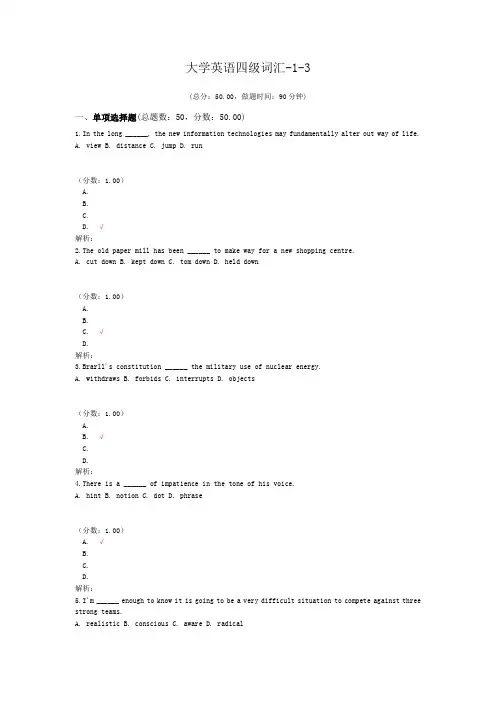
大学英语四级词汇-1-3(总分:50.00,做题时间:90分钟)一、单项选择题(总题数:50,分数:50.00)1.In the long ______, the new information technologies may fundamentally alter out way of life.A. viewB. distanceC. jumpD. run(分数:1.00)A.B.C.D. √解析:2.The old paper mill has been ______ to make way for a new shopping centre.A. cut downB. kept downC. tom downD. held down(分数:1.00)A.B.C. √D.解析:3.Brarll's constitution ______ the military use of nuclear energy.A. withdrawsB. forbidsC. interruptsD. objects(分数:1.00)A.B. √C.D.解析:4.There is a ______ of impatience in the tone of his voice.A. hintB. notionC. dotD. phrase(分数:1.00)A. √B.C.D.解析:5.I'm ______ enough to know it is going to be a very difficult situation to compete against three strong teams.A. realisticB. consciousC. awareD. radical(分数:1.00)A. √B.C.D.解析:6.Almost all job applicants are determined to leave a good ______ on a potential employer.A. illusionB. reputationC. impressionD. reflection(分数:1.00)A.B.C. √D.解析:7.American college students are increasingly ______ with credit card debt and the consequences can be rather serious.A. boostedB. burdenedC. dischargedD. dominated(分数:1.00)A.B. √C.D.解析:8.For more than 20 years, we've been supporting educational programs that ______ from kindergartens to colleges.A. moveB. shiftC. rangeD.spread(分数:1.00)A.B.C. √D.解析:9.The little girl was so frightened that she just wouldn't ______ her grip on my arm.A. loosenB. removeC. relieveD. dismiss(分数:1.00)A. √B.C.D.解析:10.I was impressed ______ the efficiency of the work done in the company.A. inB. aboutC. withD. for(分数:1.00)A.B.C. √D.解析:11.The test results are beyond______; they have been repeated in labs all over the world.A. negotiationB. conflictC. bargainD. dispute(分数:1.00)A.B.C.D. √解析:12.Mrs. Morris's daughter is pretty and ______, and many girls envy her.A. slenderB. lightC. faintD. minor(分数:1.00)A. √B.C.D.解析:13.The native Canadians lived in ______ with nature, for they respected nature as a provider of life.A. coordinationB. acquaintanceC. contactD. harmony(分数:1.00)A.B.C.D. √解析:14.You can hire a bicycle in many places. Usually you'll have to pay a ______A. fareB. fundC. depositD. deal(分数:1.00)A.B.C. √解析:15.A study shows that students living in non-smoking dorms are less likely to ______ the habit of smoking.A. make upB. turn upC. draw upD. pick up(分数:1.00)A.B.C.D. √解析:16.If you don't like to swim, you ______ as well stay at home.A. shouldB. mayC. canD. would(分数:1.00)A.B. √C.D.解析:17.Tom, did it ever______ to you that you would be punished for cheating on exams?A. happenB. occurC. reflectD. strike(分数:1.00)A.B. √C.D.解析:18.The chairman was blamed for letting his secretary ______ too much work last week.A. take toB. take outC. take awayD. take on(分数:1.00)A.B.C.D. √解析:19.Though she began her______ by singing in a local pop group, she is now a famous Hollywood movie star.A. employmentB. careerC. occupationD. profession(分数:1.00)B. √C.D.解析:20.It's good to know that quite a few popular English expressions actually______ from the Bible.A. acquireB. obtainC. deriveD. result(分数:1.00)A.B.C. √D.解析:21.Doctors warned against chewing tobacco as a______ for smoking.A. reliefB. revivalC. substituteD. succession(分数:1.00)A.B.C. √D.解析:22.These teachers try to be objective when they______ the integrated ability of their students.A. justifyB. evaluateC. indicateD. reckon(分数:1.00)A.B. √C.D.解析:23.This is what you should bear in mind: Don't ______ a salary increase before you actually get it.A. hang onB. draw onC. wait onD. count on(分数:1.00)A.B.C.D. √解析:24.We don't know why so many people in that region like to wear dresses of such______ colors.A. lowB. humbleC. mildD. dull(分数:1.00)A.B.C.D. √解析:25.He never arrives on time and my ______ is that he feels the meetings are useless.A. preferenceB. conferenceC. inferenceD. reference(分数:1.00)A.B.C. √D.解析:26.John cannot afford to go to university, ______ going abroad.A. nothing butB. anything butC. not to speak ofD. nothing to speak of(分数:1.00)A.B.C. √D.解析:27.Science and technology have ______ in important ways to the improvement of agricultural production.A. attachedB. assistedC. contributedD. witnessed(分数:1.00)A.B.C. √D.解析:28.Mr. Smith asked his secretary to ______ a new paragraph in the annual report she was typing.A. injectB. installC. invadeD. insert(分数:1.00)A.B.C.D. √解析:29.Some people believe that since oil is scarce, the ______ of the motor industry is uncertain.A. terminalB. benefitC. fateD. estimate(分数:1.00)A.B.C. √D.解析:30.Although they lost their jobs, savings and unemployment benefits allow the couple to______their comfortable home.A. come in forB. catch up withC. look forward toD. hold on to(分数:1.00)A.B.C.D. √解析:31.Most laboratory and field studies of human behavior ______ taking a situational photograph at a given time and in a given place.A. involveB. composeC. encloseD. attach(分数:1.00)A. √B.C.D.解析:32.Actually, information technology can ______ the gap between the poor and the rich.A. linkB. breakC. allyD. bridge(分数:1.00)A.B.C.D. √解析:33.Tomorrow the mayor is to ______ a group of Canadian businessmen on a tour of the city.A. coordinateB. cooperateC. accompanyD. associate(分数:1.00)A.B.C. √D.解析:34.The machine looked like a large,______ old-fashioned typewriter.A. forcefulB. clumsyC. intenseD. tricky(分数:1.00)A.B. √C.D.解析:35.Numerous studies already link the first meal of the day to better classroom ______.A. performanceB. functionC. behaviorD. display(分数:1.00)A. √B.C.D.解析:36.There's the living room still to be______, so that's my next project.A. abandonedB. decoratedC. dissolvedD. assessed(分数:1.00)A.B. √C.D.解析:37.It is said in some parts of the world, goats, rather than cows, serve as a vital ______ of milk.A. storageB. reserveC. resourceD. source(分数:1.00)A.B.C.D. √解析:38.The news has just ______ that the president is going to visit China next month.A. come downB. come upC. come outD. come about(分数:1.00)A.B.C. √D.解析:39.Many people believe we are heading for environmental disaster ______ we radically change way we live.A. butB. althoughC. unlessD. lest(分数:1.00)A.B.C. √D.解析:40.Joe is not good at sports, but when it ______ mathematics, he is the best in the class.A. comes toB. comes up toC. comes on toD. comes around to(分数:1.00)A. √B.C.D.解析:41.______ recent developments we do not think your scheme is practical.A. In view ofB. In case ofC. In memory ofD. In favor of(分数:1.00)A. √B.C.D.解析:42.There has been a collision ______ a number of cars on the main road to town.A. composingB. consistingC. involvingD. engaging(分数:1.00)A.B.C. √D.解析:43.Nancy is only a sort of______ of her husband's opinion and has no ideas of her own.A. sampleB. reproductionC. shadowD. echo(分数:1.00)A.B.C.D. √解析:puter power now allows automatic searches of fingerprint files to match a print at a crime______.A. stageB. sceneC. locationD. occasion(分数:1.00)A.B. √C.D.解析:45.I know you've got a smooth tongue, so don't talk me ______ buying it.A. awayB. downC. outD. into(分数:1.00)A.B.C.D. √解析:46.All the arrangements should be completed ______ your departure.A. prior toB. superior toC. contrary toD. parallel to(分数:1.00)A. √B.C.D.解析:47.In order to make things convenient for the people, the department is planning to set up some ______ shops in the residential area.A. flowingB. driftingC. mobileD. unstable(分数:1.00)A.B.C. √D.解析:48.Now in Britain, wines take up four times as much ______ in the storehouse as both beer and spirits.A. blockB. landC. patchD. space(分数:1.00)A.B.C.D. √解析:panies are struggling to find the right ______ between supply and demand, but it is no easy task.A. equationB. formulaC. balanceD. pattern(分数:1.00)A.B.C. √D.解析:50."This light is too ______ for me to read by. Don't we have a brighter bulb somewhere?" said the elderly man.A. mildB. dimC. minuteD. slight(分数:1.00)A.B. √C.D.解析:。
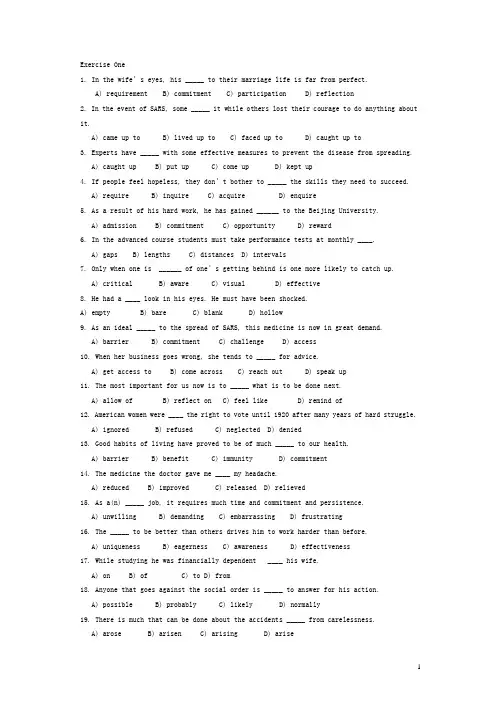
Exercise One1. In the wife’s eyes, his _____ to their marriage life is far from perfect.A) requirement B) commitment C) participation D) reflection2. In the event of SARS, some _____ it while others lost their courage to do anything about it.A) came up to B) lived up to C) faced up to D) caught up to3. Experts have _____ with some effective measures to prevent the disease from spreading.A) caught up B) put up C) come up D) kept up4. If people feel hopeless, they don’t bother to _____ the skills they need to succeed.A) require B) inquire C) acquire D) enquire5. As a result of his hard work, he has gained ______ to the Beijing University.A) admission B) commitment C) opportunity D) reward6. In the advanced course students must take performance tests at monthly ____.A) gaps B) lengths C) distances D) intervals7. Only when one is ______ of one’s getting behind is one more likely to catch up.A) critical B) aware C) visual D) effective8. He had a ____ look in his eyes. He must have been shocked.A) empty B) bare C) blank D) hollow9. As an ideal _____ to the spread of SARS, this medicine is now in great demand.A) barrier B) commitment C) challenge D) access10. When her business goes wrong, she tends to _____ for advice.A) get access to B) come across C) reach out D) speak up11. The most important for us now is to _____ what is to be done next.A) allow of B) reflect on C) feel like D) remind of12. American women were ____ the right to vote until 1920 after many years of hard struggle.A) ignored B) refused C) neglected D) denied13. Good habits of living have proved to be of much _____ to our health.A) barrier B) benefit C) immunity D) commitment14. The medicine the doctor gave me ____ my headache.A) reduced B) improved C) released D) relieved15. As a(n) _____ job, it requires much time and commitment and persistence.A) unwilling B) demanding C) embarrassing D) frustrating16. The _____ to be better than others drives him to work harder than before.A) uniqueness B) eagerness C) awareness D) effectiveness17. While studying he was financially dependent ____ his wife.A) on B) of C) to D) from18. Anyone that goes against the social order is _____ to answer for his action.A) possible B) probably C) likely D) normally19. There is much that can be done about the accidents _____ from carelessness.A) arose B) arisen C) arising D) arise20. _____ his sister, Jack is quiet and does not easily make friends with others.A) Dislike B) Unlike C) Alike D) Liking21. More new _____ will be opened up in the job market for those with a good CET6 score report.A) opportunities B) necessities C) realities D) probabilities22. Unlike the problems I _____ in high school, I have few chances to speak English in class at college.A) came across B) came about C) came after D) came of23. Now that they have not done anything ______ about the situation, it shows no evidence to return to normal.A) unique B) effective C) absolute D) sequential24. He ____ the medicine quickly and then drank some orange juice.A) sucked B) swallowed C) licked D) digested25. These products are _____ for export, though a few of them may come into home markets.A) completely B) absolutely C) essentially D) necessarily26. The team’s attempt to win the game was _____ by the opposing goalkeeper.A) shocked B) frustrated C) given up D) caught up27. He is quite sure that it’s _____ impossible for him to fulfill the task within two days.A) fully B) exclusively C) absolutely D) roughly28. The police wanted her to describe all the events of that morning in _____.A) time B) addition C) sequence D) place29. Thanks to the Internet, we can share sorrow and happiness at each other’s home through the _____ of e-mail.A) role B) medium C) modem D) sequence30. In their own eyes, it is rather _____ that the medical community as a whole still has little idea about the cause of SARS.A) rewarding B) demanding C) embarrassing D) requiringExercise Two1. On the conference, representatives from different countries_____ different viewpoints on this international issue.A) put out B) put off C) put forth D) put down2. The _____ of the seasons has long been observed by people in all parts of the world.A) rhythm B) regulation C) click D) identity3. Our research has focused on a drug which is so _____ as to be able to change brain chemistry.A) influential B) monstrous C) vigorous D) powerful4. The footballer made a(n) _____ gesture, which made the audience’s blood boil.A) immature B) offering C) offensive D) hesitative5. However, at times this balance in nature is ____, resulting in a number of possible unforeseen effects.A) troubled B) disturbed C) confused D) disgusted6. As he was unaware of the complexity of this problem, his choice was quite ____.A) rational B) arbitrary C) mechanical D) unpredictable7. Tax cuts are the most important _____ the government has for stimulating the economy.A) instruction B) equipment C) instrument D) stuff8. Spitting on the ground is not only ______ but also harmful to others’ health.A) shaming B) banging C) grabbing D) disgusting9. The residents here complain that they have been intensely _____ by the endless noises from the building sites for weeks.A) annoyed B) pierced C) wrapped D) destroyed10. The news made many students ______ that many universities still bind the issue of diploma with their CET4 results.A) awful B) upset C) tuneless D) lucky11. It is not surprising that in modern times the _______ in this month may be out of date in next.A) fashion B) anchor C) section D) brow12. The idea of winning the eyes of the people around ____ powerfully to some youngsters, so they are eagerly identifying themselves.A) sticks B) holds C) attract D) appeals13. We are expecting to see that the concerted research work will come up with a _____ solution to the problem.A) permanent B) perspective C) persistent D) persuasive14. He made ______ alterations to his house and then sold it at a huge profit.A) offensive B) horrible C) radical C) patient15. Although there is no easy cure for this fatal disease at present, some of its causes have been ______by experts.A) rebelled B) distracted C) bolted D) identified16. A positive answer makes you feel good, but a(n) ______ one teaches you a lot.A) affirmative B) negative C) offensive D) tuneless17. At the early stage of a child’s development, the family tends to have a greater _____ on him than his school.A) instrument B) identity C) communication D) influence18. Mr. Henderson was determined to remain _____. He neither stood on his wife’s side nor on his mother’s side.A) natural B) neutral C) nervous D) native19. It is a common practice in western countries that one must make a(n) _____ before seeing his doctor or visiting a friend.A) offer B) appointment C) make up D) toast20. When she was told that her cat was killed by the neighbor’s dog, the old lady _____ tears.A) reached for B) bolted out C) burst into D) turn on21.Writing is a slow process, requiring ____ thought, time and effort.A) significant B) considerable C) great D) numerous22. Thank you for applying for a position with our firm. We do not have any openings at this time, but we shall keep your application on ____ for two months.A) pile B) portion C) sequence D) file23. Only a selected number of landladies in the neighbourhood have been allowed by the university to take in _____.A) residents B) inhabitants C) lodgers D) settlers24 .During the conference the speaker tried to _____to them his feelings concerning the urgency of a favorable decision.A) comply B) impose C) imply D) convey25. He ____ his control by making his students quiet.A) assessed B) asserted C) acquired D) monitored26. If you want to get into that tunnel, you first have to ____ away all the rocks.A) repel B) pull C) transfer D) dispose27.Do you believe these two ____ friends used to be bitter enemiesA) intimate B) emotional C) intense D) supreme28. Although most dreams apparently happen______, dream activity may be provoked by external influences.A) spontaneously B) simultaneously C) homogeneously D)instantaneously29. According to the instructions we received, we cannot accept photocopies(复印件), but need the ___A) source B) resources C) origin D) original30. _____ the popular belief that classical music is too complex, it achieves a simplicity that only a genius can create.A) Subject to B) Contrary to C) Familiar to D) Similar toExerciseThree1. He is late again today. I’ll ____ that he will not be late tomorrow.A) refer to it B) look to him C) see to it D) turn to it2. As he had worked in the army as an electrical engineer for many years, he had every ____ for the job.A) privilege B) obligation C) qualification D) quality3. After the disaster, the truth ____ us that a healthy habit of living can keep one away from some terrible diseases.A) focused upon B) imposed upon C) dawned upon D) leaned upon4. After failing the exams three times, Jack realized that he’d never ____in English.A) see to it B) attain it C) catch it D) make it5. Susan has not been officially ____ to Johnson.A) engaged B) occupied C) practiced D) undertaken6. After so many years, he still ____ the hope that his lost son would return one day.A) clang to B) clung to C) inclined to D) subjected to7. The action of cheating in an examination would ____ you ____ severe punishment.A) cause…to B) subject…to C) turn…to D) take…to8. This article ____more attention to the problem of cultural interference in foreign language teaching and learning.A) calls for B) applies for C) cares for D) allows for9. I don’t think that your watch is ____.A) worthy the price B) worth the price C) worthy to buy D) worth to buy10. He is ____ a very old man but in fact he is only fifty years old.A) apparently B) evidently C) absolutely D) actually11. It is not polite to ____ a speaker with frequent questions.A) interpret B) intervene C) interrupt D) interfere12. Their daughter often turns a deaf ear to their inquiries, so they sometimes have to ____ answers from her.A) interrupt B) exchange C) squeeze D) exit13. His constant failures in love finally threw him off his ____ of mind.A) mood B) engagement C) sympathy D) balance14. My camera can be ____ to take pictures in cloudy or sunny conditions.A) adapted B) adjusted C) adopted D) remedied15. Young children soon ____ words they hear their elders use.A) put forward B) pick out C) turn up D) pick up16. We forgave his bad temper because we know that his son’s illness had put him under great____.A) upset B) stress C) crisis D) oppression17. His political ______ came to an end 20 years ago.A) occupation B) employment C) career D) profession18. The explorer lost his way so he climbed to the top of the hill to ____himself.A) spot B) locate C) place D) situate19. We could see only the ____ outline of the mountain in the distance.A) vague B) dark C) mean D) dim20. Because the company was doing more business it was necessary to____ the factory.A) increase B) extend C) broaden D) grow21.The university ____ consists of full professors, associate professors and assistant professors.A) crew B) rank C) circle D) staff22. Due to the fact that she was naturally shy, she shrank from any ____ social and cultural activities.A) taking part of B) study on C) success in D) participation in23. It was no use trying to discuss business with James, who was well-known for____ everything.A) coping with B) trifling with C) handing with D) doing well in24. Jane is scolded by her boss because she left the office with the computer ____ yesterday.A) on B) out C) in D) unclosed25. In ______ to the government’s call, a great number of people from different walks of lifewent to the frontline to fight the flood.A) return B) admission C) response D) order26. I could see nothing ____ of the hall but the moans of pain told there was someone there.A) in the dust B) in the dusk C) in the lobby D) in the exit27. In the eyes of the teachers, the textbooks are far from ____.A) content B) consent C) satisfied D) satisfactory28. Due to the _______difficulty, he has to do several part-time jobs.A). economic B). financial C). economical D). economics29. The freshmen are very slow to ____ the strict regulations of this college.A) react to B) relate to C) adapt to D) turn to30. When reading books about space exploration, I often ____ man’s skill and creativeness in putting complex pieces of machinery into space.A) tremble at B) startle at C) wander at D) amaze atExerciseFour1.The young people are _____ of their responsibility toward society.A) consistent B) conscious C) sensitive D) reliable2. The problem with your conduct is that what you do is not _____ with what you say.A) consistent B) continuous C) considerate D) continual3. She was so _____ with her job that she didn’t hear someone knocking at the door.A) attracted B) drawn C) occupied D) concentrated4. Professor Taylor’s talk has indicated that science has a very strong _____ on the everyday life of the human society.A) motivation B) perspective C) impression D) impact5. When she was criticized, she claimed that it was outside her _____ of responsibility.A) field B) limit C) extent D) range6. The world is trying every means to _____ the friendship between the two countries.A) raise B) promote C) arise D) protest7. Although not an economist himself, Dr. Smith has long been a severe critic of the government’s _____ policies.A) economical B) economy C) economic D) economics8. His constant _____ with his peers has left its mark on his growth.A) consent B) contract C) context D) contact9. _____ with his new teaching method, we need to take a critical look at our traditional ones.A) Cursed B) Depressed C) Impressed D) Fed up10. So clear was his _____ of the case that others had no more to say.A) attitude B) presentation C) comment D) remark11. When business is in _____, there is usually an obvious increase in unemployment.A) conviction B) relaxation C) depression D) competition12. Don’t take any action until you are fully _____ with the situation there.A) consented B) content C) obvious D) acquainted13. It is said that the math teacher seems _____ towards bright students.A) liable B) partial C) beneficial D) preferable14. The clothes a person wears may express his __D__ or social position.A) estate B) stature C) esteem D) status15. _____ with antique furniture, the castle brought us back in time to the Middle Ages.A) Ornamented B) Covered C) Impressed D) Improved16. One rainy night the policeman had a chance _____ with a gang of smugglers.A) acquaintance B) encounter C) account D) interview17. Newspapers vary greatly in their _____ to the government.A) attitudes B) comments C) views D) opinions18. A defect of vision prevents him from __ ___ his eyes accurately on an object.A) emphasizing B) relaxing C) focusing D) achieving19. In most cases, the _____ of a person who sits on a pin is to leap into the air.A) reaction B) behavior C) function D) instance20. Rich as they were in forms, the speaker’s _____ seemed unrelated to his speech.A) signs B) gesture C) symptoms D) symbols21. He built the team through both hard training and _____ discipline.A) loose B) physical C) rigid D) slack22. We were depressed _____ the bad news.A) at B) in C) for D) on23. She was delighted in _____ of friends and relatives.A) accommodation B) entertainment C) conviction D) commitment24. The days when he was _____ his best is already a thing of the past.A) in B) on C) with D) at25. Some people are not willing to _____ responsibility for the errors they made.A) ensure B) assure C) assume D) resume26. I speak in full _____ that our cause is just.A) conclusion B) assumption C) conviction D) determination27. Animals can become unusually _____ when they are upset by a sudden environment change.A) puzzling B) dominant C) aggressive D) vigorous28. Try to _____ your mind into the future and imagine what life will be like then.A) subject B) object C) project D) reject29. The boy felt so angry at the girl’s dominance that he could remain _____ no longer.A) positive B) passive C) optimistic D) pessimistic30. Computer software _____ some 70 percent of our range of products.A) picks up B) focuses on C) accounts for D) is based onExerciseFive1. It seems that some entertainment stars don’t attach much importance to their public _____.A) shape B) image C) status D) figure2. ____ the question of the time given to teaching preparations, there are two other requirements for a qualified teacher.A)Except B)Away from C) Apart from D) Beside from3. If it were not for the fact that he was a billionaire, she ____ him.A) might never marry B) will never marryC) would never have married D) would never marry4. The gloves were really too small, and it was only by _____ them that I managed to get them on.A) spreading B) squeezing C) stretching D) bending5. You will probably _____ your team’s chance to win because you seem to have such a great ______ them.A) affect influence B) effect; influence C) affect;effect on D) effect;affect on6. A bridge can be defined ____ a structure getting over an obstacle, such as a river, a road or railways.A) like B) as C) with D) to7. When I took my car to the garage, they soon____ what the trouble was.A) emerged B) realized C) explored D) diagnosed8. What made her heart _____ was the sight of many people begging in the streets.A) bleed B) blood C) bleeder D) bled9. Our country has launched a(n) ____ for healthy styles of living.A) war B) battle C) campaign D) action10. He departed ____ to catch the train only to find his ticket was left in home.A) in hurry B) in haste C) in a haste D) with haste11. The contract will be signed _____ the ceremony.A) prior to B) by priority of C) previous of D) precious to12. There are some areas which are still densely populated ____ their severe weather conditions.A) due to B) with regard to C) regardless of D) but for13. He’s watching TV He’s ____to be cleaning his room.A) known B) supposed C) regarded D) considered14. The public has appealed to the government to find a ____ to the problem of pollution.A) result B) response C) settlement D) solution15. It was not until he arrived in class _____ realized he had forgotten his book.A) when he B) that he C) and he D) he16. Seeing he was _____ with his luggage, I offered to help him.A) infected B) embarrassed C) mugged D) confused17. So little ____ with each other that the neighbors could not settle their difference.A) agreed did they B) did they agree C) they agree D) they did agree18. It is advisable for us to ____a more open policy.A) adapt B) adjust C) agree D) adopt19. There are several ways to _____ this problem.A) implement B) approach C) thrust D) dispose20. The conference ____ the possibility of closer trade links between the two countries.A) explored B) implemented C) established D) constituted21. ______ with the boy’s true love for her, the girl decided to entrust her life to him.A) Acquired B) Imposed C) Infected D) Diagnosed22. The runner went fastest in the middle ____ of the course.A) fragment B) selection C) board D) segment23. The more ____ you feel in yourself, the more chances you will stand to win the game.A) significance B) intensity C) fortune D) confidence24. Nothing is worse than the ____ between what is right and what is wrong.A) connection B) establishment C) illustration D) confusion25. His words might have _____ the lovely lady, but he was never aware of it.A) cursed B) criticized C) hurt D) scolded26. It is unwise of you to ____ to a conclusion before looking into the matter .A) reach B) arrive C) draw D) leap27. The ____ to ensure a bright future for myself pushed me to study harder.A) crisis B) thrust C) pressure D) approach28. A dutiful official never ____ himself of his responsibility for his work.A) reminds B) quits C) disposes D) risks29. The official ____ his innocence by showing the fact.A) approached B) explored C) established D) defined30. Advertising is distinguished from other forms of communication _____ the advertiser paysfor the message to be delivered.A) which B) because of C) in that D) whereasExerciseSix11. The train _____ into the station at nine.A) pulled B) dragged C) hauled D) pushed12. All the leaders should attach much importance to their public _____.A) shape B) image C) status D) figure13. Our ___ from London to Paris is by way of Dover and Calais.A) route B) way C) road D) routine14.In ______ to the Party’s call, a great number of doctors and nurses went to the frontlineof fighting the flood.A) return B) admission C) response D) order15. They expressed their ______ at being looked down upon by demonstration.A) optimism B) enthusiasm C) pessimism D) indignation16. In interpersonal relations, people should be _____ with each other.A) shameful B) frank C) reserved D) indifferent17. Mary has a bad cold and a _____ throat.A) sore B) painful C) tender D) sour18. His film was a complete failure, which did his reputation a lot of ______.A) damage B) harm C) injury D) ruin19. Every time when I go back to my hometown, I usually spend two days ____ of my relatives.A) going the rounds of B) rounding upC) making the rounds of D) rounding on20. Happiness doesn’t necessarily ______ money.A) go for B) go through C) go back D) go with21. It’s a disgusting thing to hear him ____ his achievements.A) complaining of B) showing up C) breaking up D) boasting of22. Control of noise is a complex technology, and it is most ______ when applied to the original design of the noisy source.A) effective B) responsible C) wicked D) considerable23. Sometimes, things go in the direction ____ our original expectations.A) alien to B) opposite to C) subject to D) native to24. Success in school _______ much hard work.A) calls for B) calls off C) calls up D) calls onExercise Seven1. When crossing a busy street, we should be very _______ of the speeding cars.A) ignorant B) cautious C) capable D) alert2. I enjoyed all his novels with the ______ of his last.A) excursion B) expedition C) exception D) explosion3. Man is controlled by his _____ as well as by his reason.A) instinct B) distinct C) institution D) impulse4. Have _____ on him, he is only a boy.A) care B) mercy C) pity D) attention5. Archeologists _____ great value to the set of ancient cooking vessels unearthed in Shanxi province.A) granted B) devoted C) attached D) directed6. I need to _____ my English if I’m going to Canada for my holidays.A) polish up B) look through C) add up D) go through7. Although he was a good swimmer, he was swept away by the _____ and drowned.A) current B) motion C) pressure D) air8. Any blind exploitation of natural resources should be seen as a ____ against our offspring.A) guilty B) sin C) robbery D) violence9. The favorable changes in her appearance are often ____ through hairdressing.A) afflicted B) affected C) effected D) infected10. North winds kept blowing all night long _____ , and the earth was frozen.A) with great effort B) in vast amount C) in vain D) with great violence11.The young man _____ his accuser and conducted his own defense in court.A) opposed B) resisted C) confronted D) withstood12. Nuclear science should be developed to benefit people _____ harm them.A) more than B) other than C) rather than D) better than13. I felt _____ for the stupid mistake I made.A) innocent B) illegal C) guilty D) unlawful14. I hate people who _____ the end of a film.A) reveal B) rewrite C) revise D) reverse15. It was reported that 20 people were _____ in the traffic accidents yesterday.A) wounded B) injured C) cruised D) confronted16. He explained to us what they _____ doing in the next year.A) intended B) attended C) extended D) pretended17. The housewives who do not go out to work often feel they are not working to their full _____.A) capacity B) strength C) length D) possibility18. He has _____ a number of journals this morning for the information he needs badly.A) looked through B) looked on C) looked over D) looked at19. The police had the photograph of the missing girl _____ in order to find her easily.A) expanded B) amplified C) multiplied D) enlarged20.The river is _____ at the bank.A) running away B) eating away C) taking away D) bringing away21. She may be _____ if you don’t reply to her soon.A) injured B) wounded C) offended D) offensive22. The equator is an _____ line.A) imaginable B) imaginative C) imaginary D) imagining23.Even as a child he showed an inclination to ______ over the other children.A) dominate B) rule C) govern D) inspect24. The explorers were _____ straits almost impassable.A) immune to B) confronted with C) capable of D) transported25. We _____ complete equality between men and women.A) omit B) suggest C) advocate D) agree26. A drugstore in America _____ not only medicines, but also sweets, drinks and other articles.A) shaves B) handles C) polishes D) tosses27. Judging from the order of importance, this matter should call for ____ consideration.A) previous B) prior C) preceding D) prime28. To have his story published, the young man certainly _____ it for at least three times.A) contrives B) fries C) polishes D) advocates29. Thanks to the progress in medicine, the life _____ of people throughout the world was greatly extended.A) temple B) span C) dam D) residence30. More and more _____ home appliances like washing machines and microwave ovens trouble the older generation.A) guilty B) instinctive C) automatic D) offensiveExercise Eight1. The sun _____ from behind the clouds it got warmer.A) emerged B) immersed C) existed D) embraced2. I haven’t read the report properly --- I’ve only _____ into it (浏览).A) dined B) dimmed C) dipped D) dripped3. Her achievement was more _____ in that she had come from such a remote area.A) popular B) famous C) remarkable D) understandable4. Living in the central Australian desert has its problems, ____ obtaining water is not the least.A) for which B) to which C) of which D) in which5. There may be a(n) ____ of truth in this idea, disagreeable though it may seem.A) element B) factor C) advantage D) concept6. I’d like to _____ a seat for the New Year’s Concert.A) preserve B) serve C) conserve D) reserve7. The story that follows ______ two famous characters of the Rocky Mountain gold rush days.A) concretes B) concerns C) proclaims D) relates8. He _____ the good chance to present his proposal to the director, and at last, it was adopted.A) realized B) seized C) delivered D) released9. They _____ in spite of the extremely difficult conditions.A) carried out B) carried off C) carried on D) carried forward10. Which sport has the most expensive training equipment, _____ players’ personal equipment and uniformsA) in place of B) in terms of C) by means of D) by way of11. The purpose of this election is to set up a government truly _____ of the people.A) typical B) representative C) characteristic D) responsible12. It will need a _____ to save the firm from running downhill.A) mystery B) therapy C) miracle D) source13. After answering an telephone from her boyfriend, she _____ herself to read a book.A) imposed B) composed C) transferred D) transformed14. Although he was getting on in years, his experience gave him a(n) _____ over his rival.A) priority B) benefit C) profit D) advantage15. I am firmly _____ that this plan would do much good to our company.A) composed B) convinced C) recognized D) satisfied16. When talking about China, people often _____ it with the Great Wall.A) think B) associate C) imagine D) assist17. I’m sure he is up to the job ______ he would give his mind to it.A) if only B) in case C) until D) unless18. I’ve _____ a lot of time and effort in this plan, and I don’t want it to fail.A) invented B) invited C) invested D) involved。
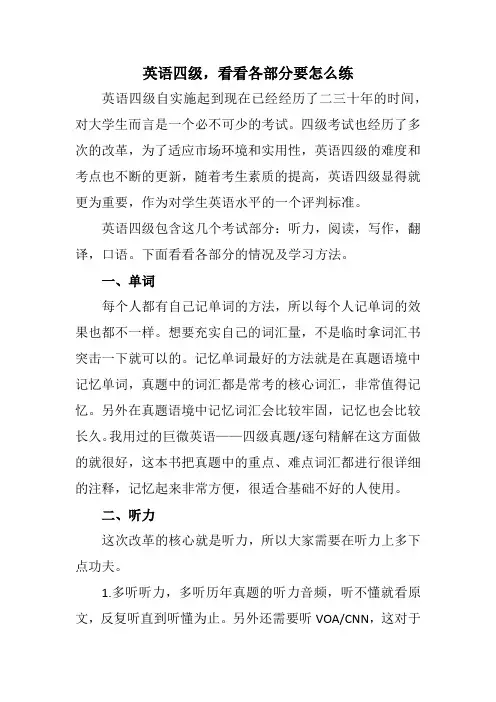
英语四级,看看各部分要怎么练英语四级自实施起到现在已经经历了二三十年的时间,对大学生而言是一个必不可少的考试。
四级考试也经历了多次的改革,为了适应市场环境和实用性,英语四级的难度和考点也不断的更新,随着考生素质的提高,英语四级显得就更为重要,作为对学生英语水平的一个评判标准。
英语四级包含这几个考试部分:听力,阅读,写作,翻译,口语。
下面看看各部分的情况及学习方法。
一、单词每个人都有自己记单词的方法,所以每个人记单词的效果也都不一样。
想要充实自己的词汇量,不是临时拿词汇书突击一下就可以的。
记忆单词最好的方法就是在真题语境中记忆单词,真题中的词汇都是常考的核心词汇,非常值得记忆。
另外在真题语境中记忆词汇会比较牢固,记忆也会比较长久。
我用过的巨微英语——四级真题/逐句精解在这方面做的就很好,这本书把真题中的重点、难点词汇都进行很详细的注释,记忆起来非常方便,很适合基础不好的人使用。
二、听力这次改革的核心就是听力,所以大家需要在听力上多下点功夫。
1.多听听力,多听历年真题的听力音频,听不懂就看原文,反复听直到听懂为止。
另外还需要听VOA/CNN,这对于做新闻听力题很有帮助。
2.对于单词的读音一定要多加注意,平时就多看看单词的音标,不仅要知道怎么读,更要读准确。
大家平时要对真题文章进行朗诵,这样对于提高语感、校正读音都很有好处。
3.对于往年听力真题和新听力都要进行练习。
首先就是要熟悉新题型的特征,这很重要。
然后就要多练习往年听力真题,这对于增强做体能力很有帮助。
三、阅读想要做好英语四级阅读题,大量的题型练习是必不可少的。
大量的练习,有助于大家归纳出试题题干和选项的特征和特点,进而就可以总结出阅读题的做题技巧。
另外,多做题还能够有效的增加大家的做题经验。
这些都有助于做题正确率的提高,也能够加快做题的速度。
阅读文章的能力一定要练好,要做到快速的阅读文章并能够把握文章的关键信息。
大家平时要不断的扩大自己的阅读量(阅读英文报纸就行),文章读的多了,阅读能力也就自然能够提升。
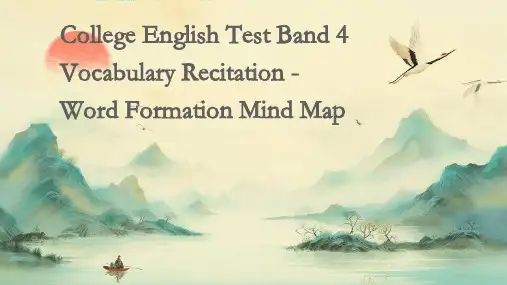

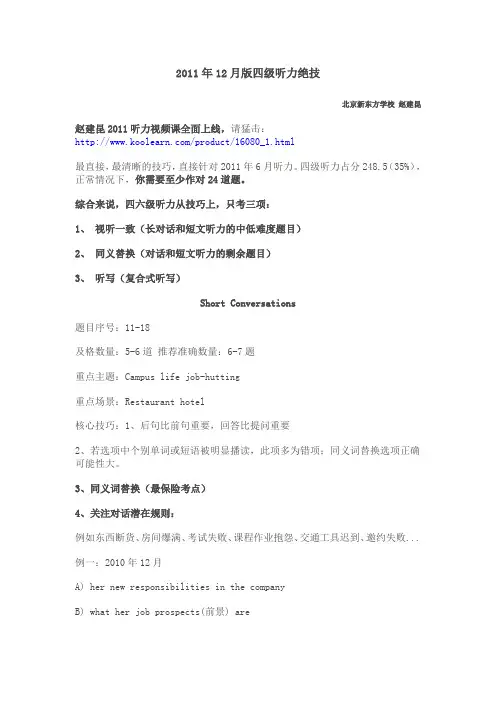
2011年12月版四级听力绝技北京新东方学校赵建昆赵建昆2011听力视频课全面上线,请猛击:/product/16080_1.html最直接,最清晰的技巧,直接针对2011年6月听力。
四级听力占分248.5(35%),正常情况下,你需要至少作对24道题。
综合来说,四六级听力从技巧上,只考三项:1、视听一致(长对话和短文听力的中低难度题目)2、同义替换(对话和短文听力的剩余题目)3、听写(复合式听写)Short Conversations题目序号:11-18及格数量:5-6道推荐准确数量:6-7题重点主题:Campus life job-hutting重点场景:Restaurant hotel核心技巧:1、后句比前句重要,回答比提问重要2、若选项中个别单词或短语被明显播读,此项多为错项;同义词替换选项正确可能性大。
3、同义词替换(最保险考点)4、关注对话潜在规则:例如东西断货、房间爆满、考试失败、课程作业抱怨、交通工具迟到、邀约失败... 例一:2010年12月A) her new responsibilities in the companyB) what her job prospects(前景) areC)what the customers’ feedback isD)the director’s opinion of her workKEY:D原文:M: How’s the new job going?W: Well, I’m learning a lot of new things, but I wish the director would give me some feedback。
Q:What does the woman want to know?本题中,第二句为考点,feedback 直接换成答案的opinion,而C项的feedback 是明显干扰。
例二:2009年12月第16题A) She must have paid a lot for the gym. B) She is known to have a terrific figure.C) Her gym exercise has yielded good results. (她的健身房练习取得好的结果)D) Her effort to keep fit is really praiseworthy.原文:W: I’ve been working out the gym since January. I was a bit out of shape.M: You look terrific. It seems that your effort has paid off.(你看起来棒极了,看来努力没有白费.)Q: What does the man imply about the woman?解析: 关注第二句,期间读到的单词全部在错项中有所体现。
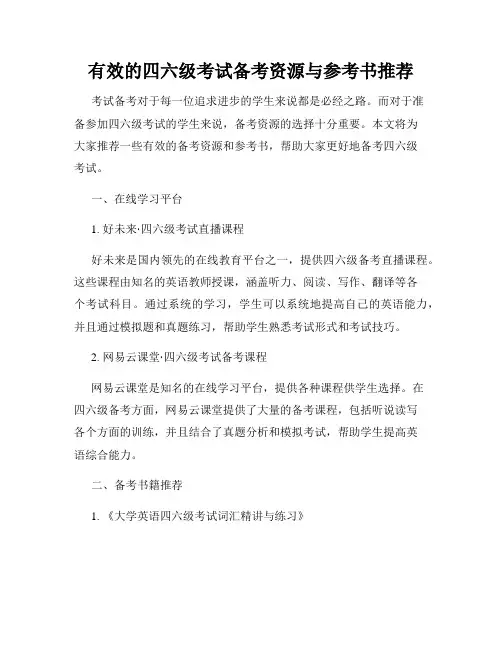
有效的四六级考试备考资源与参考书推荐考试备考对于每一位追求进步的学生来说都是必经之路。
而对于准备参加四六级考试的学生来说,备考资源的选择十分重要。
本文将为大家推荐一些有效的备考资源和参考书,帮助大家更好地备考四六级考试。
一、在线学习平台1. 好未来·四六级考试直播课程好未来是国内领先的在线教育平台之一,提供四六级备考直播课程。
这些课程由知名的英语教师授课,涵盖听力、阅读、写作、翻译等各个考试科目。
通过系统的学习,学生可以系统地提高自己的英语能力,并且通过模拟题和真题练习,帮助学生熟悉考试形式和考试技巧。
2. 网易云课堂·四六级考试备考课程网易云课堂是知名的在线学习平台,提供各种课程供学生选择。
在四六级备考方面,网易云课堂提供了大量的备考课程,包括听说读写各个方面的训练,并且结合了真题分析和模拟考试,帮助学生提高英语综合能力。
二、备考书籍推荐1. 《大学英语四六级考试词汇精讲与练习》这本书是针对四六级考试词汇的辅导教材。
书中详细解释了四六级考试常见的词汇,提供了大量的例句和练习,帮助学生巩固词汇知识,并且可以帮助考生更好地理解和应用这些词汇。
2. 《新东方·大学英语六级考试全程突破》这本书是新东方培训机构出版的备考指南,其中包含了六级听力、阅读、写作、翻译等各个方面的内容。
书中提供了大量的练习题和模拟考试,考生通过阅读这本备考指南可以熟悉考试题型,并且了解解题技巧和策略。
3. 《四六级考试写作指导》这本书是专门针对四六级写作考试的辅导书籍。
书中详细介绍了写作的基本技巧和常用表达,提供了大量的例句和范文供考生参考。
通过学习这本书,考生可以提高写作能力,同时也可以了解到写作考试的评分标准和评分要点。
三、备考APP推荐1. 小猿口袋四六级小猿口袋四六级是一款专门为四六级考生设计的备考APP。
该应用提供了大量的备考资料和练习题,包括词汇、听力、阅读、写作等各个方面。
它还提供了模拟考试和错题回顾功能,帮助考生进行有效的自我评估和进步。
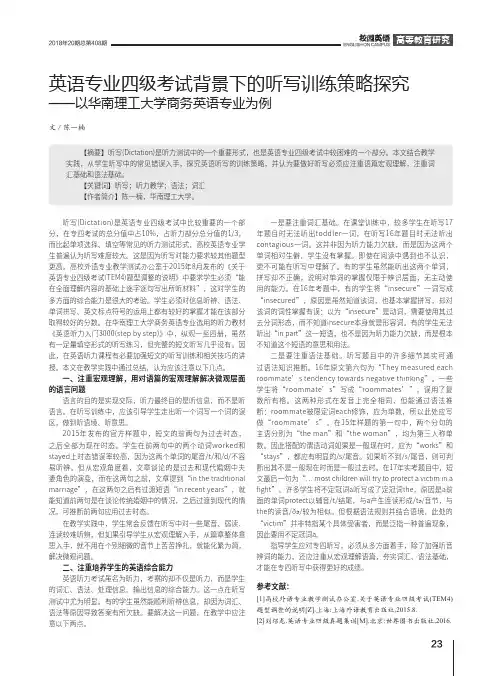
2018年20期总第408期高等教育研究ENGLISH ON CAMPUS英语专业四级考试背景下的听写训练策略探究——以华南理工大学商务英语专业为例文/陈一楠【摘要】听写(Dictation)是听力测试中的一个重要形式,也是英语专业四级考试中较困难的一个部分。
本文结合教学实践,从学生听写中的常见错误入手,探究英语听写的训练策略,并认为要做好听写必须应注重语篇宏观理解,注重词汇基础和语法基础。
【关键词】听写;听力教学;语法;词汇【作者简介】陈一楠,华南理工大学。
听写(Dictation)是英语专业四级考试中比较重要的一个部分,在专四考试的总分值中占10%,占听力部分总分值的1/3。
而比起单项选择、填空等常见的听力测试形式,高校英语专业学生普遍认为听写难度较大。
这是因为听写对能力要求较其他题型更高。
高校外语专业教学测试办公室于2015年8月发布的《关于英语专业四级考试(TEM4)题型调整的说明》中要求学生必须“能在全面理解内容的基础上逐字逐句写出所听材料”,这对学生的多方面的综合能力是很大的考验。
学生必须对信息听辨、语法、单词拼写、英文标点符号的运用上都有较好的掌握才能在该部分取得较好的分数。
在华南理工大学商务英语专业选用的听力教材《英语听力入门3000(step by step)》中,纵观一至四册,虽然有一定量填空形式的听写练习,但完整的短文听写几乎没有。
因此,在英语听力课程有必要加强短文的听写训练和相关技巧的讲授。
本文在教学实践中通过总结,认为应该注意以下几点。
一、注重宏观理解,用对语篇的宏观理解解决微观层面的语言问题语言的目的是实现交际,听力最终目的是听信息,而不是听语言。
在听写训练中,应该引导学生走出听一个词写一个词的误区,做到听语境、听意思。
2015年发布的官方样题中,短文的前两句为过去时态,之后全部为现在时态。
学生在前两句中的两个动词worked和stayed上时态错误率较高,因为这两个单词的尾音/t/和/d/不容易听辨。
王长喜大学英语考试四级大课堂(第四
讲)
同学们:
大家好。
很高兴又与同学们相聚网上课堂。
本讲我要给同学们介绍的是提高听力能
力的语言因素和知识因素。
大家都知道,要在听力测试中取得好的成绩,需要
有扎实的语言基本功、良好的听力习惯、高超的听力技能和相关的背景知识。
同学们有必要了解听力测试的特点、命题规律和应对策略。
一、语言因素在听力中的运用
听力理解可分为字面理解和深层理解。
要做到字面理解,就必须具备一定
的语音知识、一定的词汇知识和一定的语法知识。
也只有在理解字面意思的基
础上才有可能对听力材料进行深层次的理解,所以语言因素是听力理解的基
础。
我们常提到的语言因素包括:
1、语音知识
听力不同于阅读,要求同学们必须具备准确辨音的能力,这是口头交际的
基础。
在正确掌握每个单词的发音的同时,必须注意以下几个方面:
(1)中最小对立体的发音,如ship---sheep, cheap ---- chip, pig ---peg, sack ---sock等,有针对性地进行发音训练,比如绕口令之类的练习,如She sells sea cells by the seashore. If she sells sea cells by the seashore, then she sells seashore cells,适当加强一些针对性的听力练习。
鼠标左键点击下面的文件名即可进入下载界面四级最新资料四级写作2012.12英语四级写作冲刺视频-新东方许密杉赵文通--文都2012年秋季英语四级专项精讲写作【备战2012.12】新东方大师讲堂:四六级写作高分范文冲刺精讲(一)英语四级作文万能模板与句型下载,最全最实用哦【备战2012.12】英语四级预测作文范文汇总2012.12交大英语四级范文高分篇PDF下载2012.12全新大学英语四级写作强训PDF下载2012.12星火英语四级预测作文30篇2012.12四六级备考88篇预测范文,可打印,好资料不容错过!!!2012.12四六级写作指导课件,内部资料!2012.12大学英语四六级写作技巧PPT(共98页)【备战2012.12】四六级优秀作文选,最新预测作文哦!【备战2012.12】英语周计划系列丛书:大学英语新四级写作周计划(第4版)2012.12考拉进阶四级30篇预测作文2012.12环球卓越四级热点作文20篇(写作小册子),不拿白不拿!!!送礼啦~~~2012.12王长喜四级30篇预测作文XDF《2012四级写作范文100篇》,让你最后20天作文得满分~~~【好消息】最新《大学英语四六级20天写作冲关快训》(给力第二版)大家网首发华研四级2012年6月预测作文16篇+听力大家网首发2012举一反三710分四级写作典型题解大家网首发2012考拉进阶大学英语四级考试25篇押题作文+5套强化听力.rar 最新消息~大家网原创四级写作话题帖-吐血整理~~【备战2012年6月】英语四级写作备考推荐必看范文(汇总贴,给你导航)英语四级写作课程完整版下载(4)-海天教育老师丁晓忠主讲英语四级写作课程完整版下载(3)-海天教育老师丁晓忠主讲英语四级写作课程完整版下载(2)-海天教育老师丁晓忠主讲英语四级写作课程完整版下载(1)-海天教育老师丁晓忠主讲你写作文我来修改,找版主免费修改作文,快快加入我们吧!!!四级阅读大学英语四级晨读美文100篇+MP3(世界图书出版社2013年1月第一版)2012.12英语四六级阅读复习冲刺视频-新东方尹延何威威--2012年秋季英语四级专项精讲阅读星火英语•大学英语4级考试阅读高分特训(2012下) [平装]【送礼啦】2012新东方大愚英语学习丛书•新东方双语书话译丛:4级诵读菁华2012.12大学英语四六级实用总结之阅读技巧2012.12英语周计划系列丛书大学英语新四级阅读周计划(第四版)大家网首发2012举一反三710分四级阅读典型题解四级100条阅读难句~每周更新~~~英语四级阅读理解冲刺课程完整版下载(4)-海天教育老师张培主讲英语四级阅读理解冲刺课程完整版下载(3)-海天教育老师张培主讲英语四级阅读理解冲刺课程完整版下载(2)-海天教育老师张培主讲英语四级阅读理解冲刺课程完整版下载(1)-海天教育老师张培主讲徐广联:英语名篇诵读菁华大学卷四级PDF王迈迈:轻松搞定大学英语四级考试选词填空升级版【2011新版】王迈迈:轻松搞定大学英语四级考试仔细阅读升级版【2011新版】四级听力2012年12月四六级听力冲刺夺分高招视频-新东方罗蓓赵艳---2012年秋季英语四级专项精讲听力英语四级听力选择题技巧:如何预读2012.12星火英语四级300篇新闻听力PDF及录音2012.12星火英语四级精准听力法+MP3(含字幕)2012.12星火英语四级听力特训5套题+听力+原文【新书下载】2012.12交通大学四级听力题型透视与高分特训2012.12大学英语四级听力技巧精讲完整版(1-12)【备战2012.12】英语周计划系列丛书:大学英语新四级听力周计划(第4版)2012.12大学英语四级听力技巧精讲(1-12),更新在继续!2012.12王长喜四级10套标准听力及原文+答案【好东东】害怕四级短文听力的进,短文听力训练好资料等你下载2012年四级听力备考资料~不断更新中~~~大家网首发华研2012年6月四级8套强化听力+文本【大家网首发】2011.12.17四级听力MP3下载超清晰四六级听力技巧汇总,总会有一种方法适合你新东方大愚英语学习丛书-大学英语四级考试听力理解分册MP3四级词汇新东方•大学英语四级词汇:词以类记(2012年11月1日出版)【备战2012.12】神一样的英语四六级高频词汇TOP1002012年秋季刘一男四级词汇速记指南讲座视频2012.12星火英语四级2000核心词+听力【备战2012.12】新东方•4级词汇分频精讲速记(附音频资料)2012.12思思大王四级单词一笑而+六级单词一笑而过,两本词汇pdf下载链接看这里【备战2012.12】新东方刘一男【爵以词雄】词汇串讲(共八十讲全)【备战2012.12】XDF赵丽四级词汇5500串讲(共八十讲更新完毕!)多样式攻克大学英语四级词汇便携版(2012.12完整版)接着送大礼!!!2012.12王长喜四级3000高频词汇周计划大家网首发2012年6月四级备考2000词汇卡片(附有听力)2012大学英语四、六级词汇词根词缀记忆法测试版PDF备战2012年6月四级-1000个高频词汇-(听力加强版)2012最新4级词汇大全(附有音标)英语四级词汇课程完整版下载(4)-海天教育老师闫文军主讲英语四级词汇课程完整版下载(3)-海天教育老师闫文军主讲英语四级词汇课程完整版下载(2)-海天教育老师闫文军主讲英语四级词汇课程完整版下载(1)-海天教育老师闫文军主讲《大学英语四级词汇搭配+活用》2012年电子书下载新四级词汇派对记忆法[2009][完整] PDF四级语法【备战2012】英语四级考试高级语法讲义汇总四级综合(完型翻译)32字铁规搞定四六级完形填空视频-新东方卢根徐可风-2012年秋季英语四级专项精讲综合英语周计划系列丛书-大学英语新四级综合测试周计划(第4版)大家网首发2012举一反三710分四级综合典型题解王迈迈:轻松搞定大学英语四级考试完形填空升级版【2011新版】四级题库XDF备战2012年四级真题串讲班2012.12大学英语四级考试全真模拟试题2012.12星火英语四级10套预测试卷+听力+答题卡2012.12环球卓越大学英语四级考试标准预测试卷(7套模拟+2套真题视频)2012.12王长喜4级模拟试卷:10套模拟+5套真题+5套听力+30篇作文(含MP3)华研外语2012.12四级预测试卷:10套预测+2套真题+8套听力+2000词周计划+16篇作文2012.12大学英语4级考试王长喜英语预测试卷(第20版),8月份刚出版的【好消息】最新2012《大学英语四级模拟试卷》(给力第二版)大家网首发2012年6月10套大学英语4级考试命题改革与预测试卷(华研外语)历年大学英语四级真题试卷word+答案解析+听力原文+MP3(1989-2011.12)大家网首发2012年考拉进阶上海交通大学四级预测试卷及MP3.rar大家网版2011年12月大学英语四级真题图片版与pdf 版下载史上最全大学英语四级历年真题+MP3打包下载(附听力原文+答案详解)经验方法XDF备战2012年四级真题串讲班XDF备战2012年四级VIP精品强化班视频课件完整下载XDF备战2012年四级基础班视频课件完整下载XDF备战2012年四级冲刺班视频课件完整下载XDF备战2012年四级巩固班视频课件下载【备战2012.12.22】四六级给我6小时,让你提高60分!(胡立志)【2012.12英语四六级冲刺】新东方尹延--最后的复习建议(视频)【2012.12英语四六级冲刺】新东方尹延--接近真题材料推荐(视频)【2012.12英语四六级冲刺】新东方尹延--如何利用真题才是王道(视频)【2012.12英语四六级冲刺】新东方尹延--在两个选项游移怎么办(视频)【2012.12英语四六级冲刺】新东方尹延--遇到生词,蒙的技巧(视频)【2012.12英语四六级冲刺】新东方尹延--快速阅读做不完怎么办(视频)【2012.12英语四六级冲刺】新东方尹延--阅读做题速度质量如何两全(视频)【2012.12英语四六级冲刺】新东方尹延--阅读冲刺如何安排(视频)【2012.12英语四六级冲刺】新东方尹延--读懂做不对题如何应付(视频)英语四级考前三步走,成绩提高25%-文都名师徐可风2012年12月英语四级考试各科目备考策略英语四六级最后冲刺技巧篇英语四六级必胜十二大锦囊曝光英语四级听力选择题技巧:如何预读2012.12《第一次就考好英语4级》附赠MP3录音2012.12XDF四六级最新全套辅导班视频,你还能hold住吗?何凯文:2012年秋季四六级高分规划-1(视频)何凯文:2012年秋季四六级高分规划-2(视频)2012年秋季英语四六级全程规划-1(何威威)视频2012年秋季英语四六级全程规划-2(何威威)视频2012年秋季英语四六级全程规划-3(何威威)视频2012.12星火英语四级巅峰训练2012.12星火英语四级各种题型10天专项突破2012.12新东方四级完整版复习资料,辅导班内部用的,和大家分享下2012.12环球卓越四级应试宝典,让你备战四级的路上不再有弯路!【好东东】2012.12文都大学英语四级考试一本通关(最新版)【大家网原创】2012年6月16日英语四级考试答案及解析!大家网首发四级考试20天一本通大家网原创四六级每日一练(各种题型专项训练)新东方英语四级精品全程班课件(音频+视频+word)汇总某辅导班四级精讲内部材料,全方位提高四级成绩!!!英语四级考试技巧汇总大全,共175页PDF,要的拿去!【晒分+吐槽+经验神帖】通过的,没有通过的,压线的亲们快来发泄下吧!!!四级口语资料四六级口语考试精华资料汇总机考资料大家网首发2012考拉进阶大学英语四级机考文件【四六级机考】机考时代,你有木有加入?(内含机考参考资料)更多精华资料请点击【四级备考】历年精华资料大全六级最新资料六级写作【备战2012.12】新东方大师讲堂:四六级写作高分范文冲刺精讲(一)【备战2012.12】英语六级预测作文范文汇总2012.12星火英语六级考试五步作文法2012.12四六级备考88篇预测范文,可打印,好资料不容错过!!!2012.12四六级写作指导课件,内部资料!2012.12大学英语四六级写作技巧PPT(共98页)【备战2012.12】四六级优秀作文选,最新预测作文哦!【备战2012.12】英语周计划系列丛书-大学英语新六级写作周计划(第4版)2012.12考拉进阶六级最新作文30篇2012.12新东方六级写作模板完整版辅导班内部最新讲义,共431页的内部资料!2012.12环球卓越六级热点作文20篇(写作小册子)2012.12王长喜六级30篇作文,刚刚出版的哦【好消息】最新《大学英语四六级20天写作冲关快训》(给力第二版)大家网首发2012考拉进阶大学英语六级考试25篇作文+16篇强化阅读新东方内部资料--四六级写作背诵范文精选【备战2012】XDF六级写作翻译特训(内部资料)【备战2012】英语六级写作分类范文汇总,给你导航~~~2012六级写作范文28篇【备战2012】六级写作话题与范文汇总你写作文我来修改,找版主免费修改作文,快快加入我们吧!!!赵文通--文都2012年秋季英语六级专项精讲写作2012.12六级写作冲刺终极法则-新东方许密杉六级阅读大学英语六级晨读美文70篇+MP3(2013年1月第一版)2012.12大学英语四六级实用总结之阅读技巧[大学英语阅读真题深度训练(6级)].陈玲.扫描版【备战2012.12】最新大学英语新六级阅读周计划(第4版)更新完毕!六级100条阅读难句~每周更新~~~【备战2012】六级阅读理解107篇练习题六级阅读:简答题与选词填空词-突破经验的做题技巧何威威--2012年秋季英语六级专项精讲阅读2012.12英语四六级阅读复习冲刺视频-新东方尹延徐广联:英语名篇诵读菁华大学卷六级PDF六级听力2012.12星火英语六级精准听力法2012.12星火英语六级听力直通249分+MP3(含字幕)【备战2012.12】英语周计划系列丛书:大学英语新6级听力周计划(第4版)2012.12王长喜六级10套标准听力及原文+答案2012六级听力备考资料大全~不断更新中~~~四六级听力技巧汇总,总会有一种方法适合你赵艳--2012年秋季英语六级专项精讲听力2012年12月四六级听力冲刺夺分高招视频-新东方罗蓓张益明:英语听力自我测试大学英语六级.pdf六级词汇2012年秋季刘一男四级词汇速记指南讲座视频【备战2012.12】新东方•6级词汇分频精讲速记(附音频资料)2012.12思思大王四级单词一笑而+六级单词一笑而过,两本词汇pdf下载链接看这里2012.12六级词汇打印版(附音标)2012.12刘一男六级词汇全球独家精讲音频(1-5讲)2012.12六级词汇词根+联想记忆法(便携版)-俞敏洪编著长喜英语六级词汇周计划PDF(含MP3)+最新三次六级考试真题词汇速记卡片(含MP3)2012.12环球卓越六级500高频短语,最新资料哦!!!2012.12王长喜六级3000分频词汇周计划,最新资料等你下载!!!2012大学英语四、六级词汇词根词缀记忆法测试版PDF2012最新六级词汇大全备战2012年6月六级-1000个高频词汇(听力加强版)刘一男六级6000词汇精讲视频【备战2012】上海新东方任煜老师无敌六级核心600词汇-精美打印版【备战2012.12】神一样的英语四六级高频词汇TOP100大学英语四、六级词汇词根词缀记忆法测试版PDF六级词汇词根联想记忆法乱序版便携DJVU新六级词汇派对记忆法[2009][完整] PDF陈新仁:[2010]谁还在背单词大学英语六级词汇第2版【大家网首发】六级语法【备战2012】XDF六级语法透析大学英语六级考试语法资料下载汇总六级综合(完型翻译)2012.12星火英语六级完型+改错+翻译+语法训练[大学英语六级写作、翻译周周练].陈慧莲.庄起敏.武小莉.扫描版【备战2012.12】英语周计划系列丛书-大学英语新六级综合测试周计划(第4版)2012XDF《大学英语六级综合题型考点解密》-最新资料等你下载哦~~徐可风-2012年秋季英语六级专项精讲综合(第1课时)32字铁规搞定四六级完形填空视频-新东方卢根六级题库2012.12淘金英语六级真题集训,800多兆的资料,赶快来下载吧2012.12大学英语六级考试全真模拟试题PDF+MP3下载2012.12环球卓越大学英语六级考试标准预测试卷(7套模拟+2套真题视频)2012.12王长喜六级模拟试卷:10套模拟+5套真题+5套听力+30篇作文(附MP3)华研外语2012.12六级考试预测试卷:10套预测+2套真题+8套听力+2000词周计划+16篇作文2012.12大学英语6级考试王长喜英语预测试卷(第20版),8月份刚出版的环球卓越2011.6六级真题精讲视频,赛过新东方哦!!!环球卓越2010.12六级真题精讲视频,赛过新东方哦!!!【大家网原创】2012年6月16日英语六级考试答案原题及解析!最新2012《大学英语六级模拟预测》过关卷,好东东哦~~~2012《大学英语六级模拟预测题-高分卷》最新资料等你下载哦大家网首发2012《大学英语六级考试710分全真模拟》附2011年6、12月真题及解析大家网首发2012年考拉进阶上海交通大学六级预测试卷及听力MP3.rar史上最全大学英语六级历年真题+MP3(附听力原文+答案详解)刘金龙:英语六级历年真题及详解[2010].pdf技巧提高版英语6级710分全真预测卷大学英语6级考试710分全真模拟试卷及详解PDF淘金高阶6级考试巅峰训练710分新题型PDF经验方法2012.12《第一次就考好英语6级》附MP3录音2012.12XDF四六级最新全套辅导班视频,你还能hold住吗?XDF新六级2012.12全套课程,网站打进去直接可以听课,学校购买课程何凯文:2012年秋季四六级高分规划-1(视频)何凯文:2012年秋季四六级高分规划-2(视频)2012年秋季英语四六级全程规划-1(何威威)视频2012年秋季英语四六级全程规划-2(何威威)视频2012年秋季英语四六级全程规划-3(何威威)视频【备战2012】最牛的六级应试宝典等你拿,别错过咯!!!2012XDF大学英语六级必过攻略之核心资料篇完整版(更新完毕)大家网首发六级考试20天一本通大家网原创四六级每日一练(各种题型专项训练,并有英文歌曲听写)2012秋季何凯文六级考前点拨预测课程【晒分+吐槽+经验神帖】通过的,没有通过的,压线的亲们快来发泄下吧!!!【备战2012.12】新东方大师讲堂:英语四六级考前复习【2012.12英语四六级冲刺】新东方尹延--最后的复习建议(视频)【2012.12英语四六级冲刺】新东方尹延--接近真题材料推荐(视频)【2012.12英语四六级冲刺】新东方尹延--如何利用真题才是王道(视频)【2012.12英语四六级冲刺】新东方尹延--在两个选项游移怎么办(视频)【2012.12英语四六级冲刺】新东方尹延--遇到生词,蒙的技巧(视频)【2012.12英语四六级冲刺】新东方尹延--快速阅读做不完怎么办(视频)【2012.12英语四六级冲刺】新东方尹延--阅读做题速度质量如何两全(视频)【2012.12英语四六级冲刺】新东方尹延--阅读冲刺如何安排(视频)【2012.12英语四六级冲刺】新东方尹延--读懂做不对题如何应付(视频)【备战2012.12.22】四六级给我6小时,让你提高60分!(胡立志)六级口语四六级口语考试精华资料汇总机考资料2012.12星火英语六级2套网考题大家网首发2012考拉进阶大学英语六级机考文件.rar更多精华资料请点击【六级备考】历年精华资料大全大学英语四六级各辅导班最新全套视频2012秋季何凯文六级考前点拨预测课程【备战2012.12】新东方大师讲堂:四六级写作高分范文冲刺精讲(一)【备战2012.12】新东方大师讲堂:英语四六级考前复习【2012.12英语四六级冲刺】新东方尹延--最后的复习建议(视频)【2012.12英语四六级冲刺】新东方尹延--接近真题材料推荐(视频)【2012.12英语四六级冲刺】新东方尹延--如何利用真题才是王道(视频)【2012.12英语四六级冲刺】新东方尹延--在两个选项游移怎么办(视频)【2012.12英语四六级冲刺】新东方尹延--遇到生词,蒙的技巧(视频)【2012.12英语四六级冲刺】新东方尹延--快速阅读做不完怎么办(视频)【2012.12英语四六级冲刺】新东方尹延--阅读做题速度质量如何两全(视频)【2012.12英语四六级冲刺】新东方尹延--阅读冲刺如何安排(视频)【2012.12英语四六级冲刺】新东方尹延--读懂做不对题如何应付(视频)赵艳---2012年秋季英语四级专项精讲听力赵艳--2012年秋季英语六级专项精讲听力何威威--2012年秋季英语六级专项精讲阅读何威威--2012年秋季英语四级专项精讲阅读赵文通--文都2012年秋季英语四级专项精讲写作赵文通--文都2012年秋季英语六级专项精讲写作徐可风-2012年秋季英语四级专项精讲综合徐可风-2012年秋季英语六级专项精讲综合(第1课时)【备战2012.12.22】四六级给我6小时,让你提高60分!(胡立志)32字铁规搞定四六级完形填空视频-新东方卢根2012年12月四六级听力冲刺夺分高招视频-新东方罗蓓2012.12英语四六级阅读复习冲刺视频-新东方尹延2012.12英语四级写作冲刺视频-新东方许密杉2012.12六级写作冲刺终极法则-新东方许密杉XDF新六级2012.12全套课程,网站打进去直接可以听课,学校购买课程XDF备战2012年四级真题串讲班XDF备战2012年四级VIP精品强化班视频课件完整下载XDF备战2012年四级基础班视频课件完整下载XDF备战2012年四级冲刺班视频课件完整下载XDF备战2012年四级巩固班视频课件下载英语四级写作课程完整版下载(4)-海天教育老师丁晓忠主讲英语四级写作课程完整版下载(3)-海天教育老师丁晓忠主讲英语四级写作课程完整版下载(2)-海天教育老师丁晓忠主讲英语四级写作课程完整版下载(1)-海天教育老师丁晓忠主讲英语四级词汇课程完整版下载(4)-海天教育老师闫文军主讲英语四级词汇课程完整版下载(3)-海天教育老师闫文军主讲英语四级词汇课程完整版下载(2)-海天教育老师闫文军主讲英语四级词汇课程完整版下载(1)-海天教育老师闫文军主讲英语四级阅读理解冲刺课程完整版下载(4)-海天教育老师张培主讲英语四级阅读理解冲刺课程完整版下载(3)-海天教育老师张培主讲英语四级阅读理解冲刺课程完整版下载(2)-海天教育老师张培主讲英语四级阅读理解冲刺课程完整版下载(1)-海天教育老师张培主讲英语六级写作课件下载地址(海天辅导班2012.12月最新视频)英语六级词汇课件下载地址(海天辅导班2012.12月最新视频)英语六级阅读理解课件下载地址(海天辅导班2012.12月最新视频)【最新资料】2012年新东方刘一男六级词汇速记宝典最新资料:2012年新东方六级听力必备词汇课程2012下半年XDF六级强化听力视频课程+讲义2012下半年XDF六级核心词汇班视频+讲义2012下半年XDF六级写作模板班视频+讲义2012下半年XDF六级强化综合精品视频+讲义2012下半年XDF六级强化阅读视频课程+讲义2012下半年XDF六级真题串讲冲刺阶段视频+讲义2012下半年XDF六级强化听力视频特训营视频+讲义2012下半年XDF六级考前点睛阅读课程视频+讲义2012下半年XDF六级考前点睛综合课程视频+讲义2012下半年XDF六级强化精品阅读视频+讲义2012下半年XDF六级强化精品写作翻译视频+讲义2012下半年XDF六级考前点睛写作新题型精讲+讲义2012下半年XDF六级考前点睛写作翻译课程+讲义2012下半年XDF六级基础之基础语法视频+讲义2012下半年XDF六级考前点睛听力课程+讲义2012下半年XDF六级基础六级词汇前世今生视频+讲义2012下半年XDF六级基础高级语法视频+讲义2012下半年XDF六级基础长难句精讲视频+讲义2012下半年XDF六级翻译抢分课程视频+讲义2012.12新东方四级完整版复习资料,辅导班内部用的,和大家分享下2012.12新东方六级写作模板完整版辅导班内部最新讲义,共431页的内部资料!新东方老师强调四六级考前最后一天必须重温的100个最高频词汇(绝密)!!!!!!!!!!!!!!!【XDF视频】2012年6月英语四六级高分冲刺技巧-最后的冲刺!!!【XDF视频】2012年6月英语四六级模拟真题演练-最后的冲刺!!!【XDF视频】2012年6月英语四六级快速提分技巧-最后的冲刺!!!【XDF视频】2012年6月英语四六级完形填空备考-最后的冲刺!!!【XDF视频】2012年6月英语四六级冲刺备考战略-最后的冲刺!!!【XDF视频】2012年6月英语四六级写作冲刺技巧-最后的冲刺!!!【XDF视频】2012年6月英语四六级之阅读答题技巧-最后的冲刺!!!【XDF视频】2012年6月英语四六级之阅读技巧-最后的冲刺!!!【XDF视频】2012年6月英语四六级之阅读审题技巧-最后的冲刺!!!XDF2012年6月英语四六级写作提分技巧指导视频,最后的战斗!!!XDF2012年6月英语四六级考前词汇考点记忆方法视频,最后的冲刺,加油!!!XDF2012年6月英语四六级考前综合指导视频,完型,翻译再不用愁咯XDF2012年6月英语四六级听力考前提分技巧精讲视频,别错过哦!!!XDF2012年6月英语四六级阅读理解冲刺指导视频,冲刺正式开始咯!【备战2012】XDF六级长难句分析【备战2012】XDF六级语法透析【备战2012】六级新题型精品课程XDF六级听力特训(内部资料)【备战2012】XDF六级写作翻译特训(内部资料)新东方2010年12月六级真题讲解视频新东方2011年6月六级精讲视频新东方六级2010年6月真题精讲视频新东方六级完型填空历年真题精讲视频刘一男六级6000词汇精讲视频2012四级备考资料大全,史上最全最有效~新东方不错的英语四级词汇学习,值得一看新东方2011年英语四六级精品全程班各大名师指导视频下载新东方内部资料--四六级写作背诵范文精选《新东方四级30天90分》学习笔记---词汇篇新东方英语900句+高清MP3新东方英语写作点睛之笔200句-很实用哦~~~新东方四级词汇笔记非常完整版新东方四级词汇词根+联想记忆法乱序版(MP3+lrc字幕)新东方刘一男的四级词汇的前世今生四级视频讲义,真的很不错哦,快来下载啊【大家网首发】新东方《大学英语四级阅读考点解密》PDF电子书下载新东方老师总结的所有四级写作资料大全新东方2011英语四级精品全程班-刘一男新4000核心词汇700串讲(音频+视频+word)四级词汇:刘一男四级词汇+视频。
2016年-2018年6月份四级考试真题(附带答案解析及听力原文)考试时间安排:一般在6月18日和12月17日左右大学英语四级考试流程8:50---9:00试音时间9:00---9:10播放考场指令,发放作文考卷9:10取下耳机,开始作文考试9:35发放含有快速阅读的试题册(但9:40才允许开始做)9:40---9:55做快速阅读9:55---10:00收答题卡一(即作文和快速阅读)9:55---10:00重新戴上耳机,试音寻台,准备听力考试10:00开始听力考试,电台开始放音听力结束后完成剩余考项。
11:20全部考试结束。
Part ⅠWriting (30minutes)Directions: For this part, you are allowed 30 minutes to write a short essay entitled Excessive Packaging following the outline given below. You should write at least 120 words but no more than 180 words.1.目前许多商品存在过度包装的现象2.出现这一现象的原因3.我对这一现象的看法和建议On Excessive PackagingPart Ⅱ Reading Comprehension(Skimming and Scanning)(15minutes)Directions: In this part, you will have 15 minutes to go over the passage quickly and answer the questions on Answer sheet 1. For questions 1-7,choose the best answer from the four choices marked A),B),C)and D). For questions 8-10,complete the sentences with the information given in the passage.Small Schools RisingTh is year‟s list of the top 100 high schools shows that today, those with fewer students are flourishing.Fifty years ago, they were the latest thing in educational reform: big, modern, suburban high schools with students counted in the thousands. As baby boomers(二战后婴儿潮时期出生的人) came of high-school age, big schools promised economic efficiency. A greater choice of courses, and, of course, better football teams. Only years later did we understand the trade-offs this involved: the creation of excessive bureaucracies(官僚机构),the difficulty of forging personal connections between teachers and students.SAT scores began dropping in 1963;today,on average,30% of students do not complete high school in four years, a figure that rises to 50% in poor urban neighborhoods. While the emphasis on teaching to higher, test-driven standards as set in No Child Left Behind resulted in significantly better performance in elementary(and some middle)schools, high schools for a variety of reasons seemed to have made little progress.S ize isn‟t everything, but it does matter, and the past decade has seen a noticeable countertrend toward smaller schools. This has been due ,in part ,to the Bill and Melinda Gates Foundation, which has invested $1.8 billion in American high schools, helping to open about1,000 small schools-most of them with about 400 kids each with an average enrollment of only150 per grade, About 500 more are on the drawing board. Districts all over the country are taking notice, along with mayors in cities like New York, Chicago and San Diego. The movement includes independent public charter schools, such as No.1 BASIS in Tucson, with only 120high-schoolers and 18 graduates this year. It embraces district-sanctioned magnet schools, such as the Talented and Gifted School, with 198 students, and the Science and EngineeringMagnet,with383,which share a building in Dallas, as well as the City Honors School in Buffalo, N.Y., which grew out of volunteer evening seminars for students. And it includes alternative schools with students selected by lottery(抽签),such as H-B Woodlawn in Arlington, Va. And most noticeable of all, there is the phenomenon of large urban and suburban high schools thathave split up into smaller units of a few hundred, generally housed in the same grounds that once boasted thousands of students all marching to the same band.Hillsdale High School in San Mateo, Calif, is one of those, ranking No.423—among the top 2% in the country—on Newsweek‟s annual ranking of America‟s top high schools. The success of small schools is apparent in the listings. Ten years ago, when the first Newsweek list based on college-level test participation was published, only three of the top 100 schools had graduating Classes smaller than 100 students. This year there are 22. Nearly 250 schools on thefull ,Newsweek list of the top 5% of schools nationally had fewer than 200 graduates in 2007.Although many of Hillsdale‟s students came from wealthy households, by the late 1990 average test scores were sliding and it had earned the unaffectionate nickname (绰号) “Hillsjail. ” Jeff Gilbert. A Hillsdale teacher who became principal last year, remembers sitting with other teachers watching students file out of a graduation ceremony and asking one another in astonishment, “How did that student graduate?”So in 2003 Hillsdale remade itself into three “houses,” romantically named Florence, Marrakech and Kyoto. Each of the 300 arriving ninth graders are randomly(随机地) assigned to one of the houses. Where they will keep the same four core subject teachers for two years, before moving on to another for 11th and 12t h grades. The closeness this system cultivates is reinforcedby the institution of “advisory” classes Teachers meet with students in groups of 25, five mornings a week, for open-ended discussions of everything from homework problems to bad Saturday-night dates. The advisers also meet with students privately and stay in touch with parents, so they are deeply invested in the students‟ success.“We‟re constantly talking about one another‟s advisers,” says English teacher Chris Crockett. “If you hear that yours isn‟t doing well in math, or see them sitting outside the dean‟s office, it‟s like a personal failure.” Along with the new structure came a more demanding academic program, the percentage of freshmen taking biology jumped from 17 to 95.“It was rough for some. But by senior year, two-thirds have moved up to physics,” says Gilbert “Our kids are coming to school in part because they know there are adults here who know themand care for th em.”But not all schools show advances after downsizing, and it remains to be seen whether smaller schools will be a cure-all solution.The Newsweek list of top U.S. high schools was made this year, as in years past, according to a single metric, the proportion of students taking college-level exams. Over the years this system has come in for its share of criticism for its simplicity. But that is also its strength: it‟s easy for readers to understand, and to do the arithmetic for their own schools if they‟d like.Ranking schools is always controversial, and this year a group of 38 superintendents(地区教育主管)from five states wrote to ask that their schools be excluded from the calculation.“It is impossible to know which high schools are …the best‟ in the nation, ”their letter read. in part. “Determining whether different schools do or don‟t offer a high quality of education requires a look at man different measures, including students‟ overall academic accomplishments and their subsequent performance in college. And taking into consideration the unique needs of their communities.”In the end, the superintendents agreed to provide the data we sought, which is, after all, public information. There is, in our view, no real dispute here, we are all seeking the same thing, which is schools that better serve our children and our nation by encouraging students to tackle tough subjects under the guidance of gifted teachers. And if we keep working toward that goal, someday, perhaps a list won‟t be necessary.注意:此部分试题请在答卡1上作答.1.Fifty years ago. big. Modern. Suburban high schools were established in the hope of __________.A) ensuring no child is left behindB) increasing economic efficiencyC) improving students‟ performance on SATD)providing good education for baby boomers2. What happened as a result of setting up big schools?A)Teachers‟ workload increased.B)Students‟ performance declined.C)Administration became centralized.D)Students focused more on test scores.3.What is said about the schools forded by the Bill and Melinda Gates foundation?A)They are usually magnet schools.B)They are often located in poor neighborhoods.C)They are popular with high-achieving students.D)They are mostly small in size.4.What is most noticeable about the current trend in high school education?A)Some large schools have split up into smaller ones.B)A great variety of schools have sprung up in urban and suburban areas.C)Many schools compete for the Bill and Melinda Gates Foundation funds.D)Students have to meet higher academic standards.5.Newsweek ranked high schools according to .A)their students‟ academic achievementB)the number of their students admitted to collegeC)the size and number of their graduating classesD)their college-level test participation6.What can we learn about Hillsdale‟s students in the late 1990s?A)They were made to study hard like prisoners.B)They called each other by unaffectionate nicknames.C)Most of them did not have any sense of discipline,D)Their school performance was getting worse.7.According to Jeff Gilbert, the “advisory” classes at Hillsdale were set up so that students could .A)tell their teachers what they did on weekendsB)experience a great deal of pleasure in learningC)maintain closer relationships with their teachersD)tackle the demanding biology and physics courses8. is still considered a strength of Newsweek‟s school ranking system in spite of the criticism it receives.9.According to the 38 superintendents, to rank schools scientifically, it is necessary to use .10.To better serve the children and our nation, schools students to take .Part Ⅲ Listening Comprehension (35minutes)Section ADirections: in this section you will hear 8 short conversations, one or more questions will be asked about what was said. Both the conversation and the questions will be spoken only once. After each question there will be a pause. During the pause, you must read the four choices marked A)、B)、C)and D)、and decide which is the best answer. Then mark the corresponding letter on Answer sheet 2 with a single line through the centre.注意:此部分试题请在答案卡2上作案。
大学英语四级改革适用(听力)模拟试卷289(题后含答案及解析)题型有:1. What is the news report mainly about?2. What is the purpose of the establishment of new MCZs?1.A.The establishment of MCZs in the UKB.The government has committed to setting up 50 MCZs.C.Wildlife organizations are satisfied with the announcement.D.People are worry about that there is no management plan.正确答案:A解析:新闻从开头开始便提到英国水域的新海洋保护区域(MCZs)的设立,随后便讲了其意义和目的。
故A“建立英国海洋保护区”正确。
B“政府承诺建立50个海洋保护区”、C“野生动物组织对这一声明很满意”和D“人们担心缺乏管理方案”均有在新闻中提到,但都只是报道的细节,不足以概括整篇报道。
知识模块:听力2.A.To protect the territory of the UKB.To balance competing interests in the reserves.C.To protect habitats, geological features and species.D.To protect the profits of fishermen’s groups.正确答案:C解析:新闻最后提到,目的是保护珊瑚群等栖息地,白垩礁等地质特征,和诸如茎水母和大鳌虾等物种。
故C“保护栖息地、地质特征及物种”正确。
A“保护英国的领土”、B“平衡保护区内的利益竞争”和D“保护渔民的利益”均没有在新闻中提到。
知识模块:听力听力原文:Gen Badrodin Haiti, the national police chief, said Sunakim and one other attacker had both been convicted criminals. Jakarta’s chief of police, Insp Gen Tito Karnavian, said a hunt was under way for terror cells believed to be behind the attack. (3)Three men were arrested near Jakarta early on Friday, police told local media A police spokesman, Anton Charliyan, confirmed on Friday that those who organised the attacks were associated with IS. Two of the criminals, he added, were “known to have committed similar radical activities some time ago”. Earlier, Bahrum Nairn, an Indonesian believed to be fighting with IS in Syria, was named as the suspected co-ordinator. (4)Insp Gen Karnavian said Nairn’s “vision”was to unite various IS-supporting groups across South East Asia. IS released a statement saying it had targeted citizens of countries which are part of the international alliance fighting the group, which controls parts of Syria and Iraq. 3. When were the three attackers arrested?4. What was the Bahrum Nairn’s vision?3.A.On Monday.B.On Thursday.C.On Friday.D.On Sunday.正确答案:C解析:选项均为日期,预读选项时可判断本题询问时间,听音时应特别留意出现的时间点及其对应的事件。
— 1 —大学英语新四级听力应对策略主讲:闫文军第一节 新四级听力应试策略听力是外语学习水平提高的“瓶颈”,是许多考生头疼的原因,随着听力分量的增加,听力在新四级中必然会给广大考生更大的挑战。如何突破这个“瓶颈”?笔者分三个方面来条分缕析,希望给大家一种柳暗花明的境界。
1.关于传统听力短对话的解剖:所谓的传统听力实际上包括短对话和短文听力两项内容。关于短对话,在传统的四级考试里有十个题目,涉及前文提到的十大类场景。考生应对的技巧比较容易操作:● 拿出真题的带子,耐心听它100道题目,而且要反复听这写对话,直到你听着第一个人说话,就能确定对话的中心事件,并且能不自觉地反映出第二个人要说什么,最好是已经开始下意识地去设想不同的可能 (也就是说开始合理改变对话内容和场景) 。● 针对这些对话中的不同场景,进行合理归类,并且总结其中的语言点,并以有效的方式去提炼规律性的语言交际功能,并且结合听力测试的形式,想象校园生活中常见的英语交际场景 (主动迎战才能克服心理恐惧)
● 争分夺秒抢时间阅读选项,并且尽可能快地预测对话的中心内容、以及可能提出的问题。这种阅读是快速的,也应当是高效的,考生一般可以根据三一规律,即四个选项中有三个可比的,首先排除那个不搭界的。另外再根据正反规律,从三个选项中寻找截然对立的两个,根据统计分析,答案往往出自其一。● 听力测试过程实际上也是个快速阅读的过程,考生必须在训练过程中有足够的阅读速度训练,场景预测训练,信息加工训练 (包括分析提炼、综合加工、假设验证、准确定论) 。● 反复聆听相同内容,不断总结测试要点,多方分析对话内容,大胆设计不同问题和选择内容。 (中国有句古话,久病自成医,考生通过大量地听、读、分析、预测、假设、验证,相信能够游刃有余地应对新四级听力中的对话内容) 。● 在真正地考试中,除了快速阅读选项,大胆预测场景,再就是集中精力去听,即使准备再充分,精力再集中,我们也不可能排除紧张心理和压力,所以,最后一招制胜的法宝就是迅速提取关键词 (也叫场景标记词汇) ,比如饭店场景应当有menu, order, tip和词汇表里常见的菜名。而银行场景则少不了 clerk account, cash, check, interest 等场景和职业标记词汇。— 2 —
大学英语四级听力及词汇强化2.对于长对话的解剖● 长对话在新四级中有两个,包括7个多项选择题目。之所以叫长对话,就是因为话轮超交替超过一次以上一般达到四到五次。对话双方讨论的主题事件不变,信息都是围绕这个中心事件展开,在不断地重复中有利于考生印证自己的判断。● 长对话信息量增加了,信息点也分散了,所用的时间也长了,这些变化都增加了精力专著的难度,所以考生在训练过程中,应当下意识地集中注意力,提取关键词汇和有用信息,排除次要信息和不相关信息 (学会明智地取舍是成功的关键所在) 。● 长对话的话轮交替符合日常交际的真实特点,对话过程基本上都有背景杂音,对话的组织也比较松散,形式比较生动鲜活,所以考生应当充分利用已知的信息来合理定位相关问题,以及这些问题的答案所在。● 长对话和短对话比较,增加了对考生短时记忆的挑战。所以在具体的考试中间,考生还应当学会速记。速记的方法可以不同,前提是考生自己能够在做题的时候识别自己的记号。● 根据6月24日的长对话分析,出题顺序基本按照听力材料的先后顺序,所以考生在听力考试中,可以借阅读选项的机会,寻求有用线索,进行大胆预测和丰富的想象,从实现理解时的快速和准确。● 对于长对话听力的训练,考生一定要首先确定话题的中心事件,抓住说话人的语气,以及透过语气所表达的态度,其次才是对话中引用重要时间、人物、数据等关键信息。
3.关于短文听力的解剖:● 短文听力包括三篇文章,其中较短的约150词,较长的约200词。材料本身难度不算太大,关键在于能否听懂大意、抓住要点、记住主要情节。短文后面的问题大都是特殊疑问句。问题多问关于短文的主题、有关讲话人的情况、事实与细节、事情的因与果等,有时要求根据短文的内容作出其它推论。 大体说来,短文听力中题目比较客观、直接。这是因为题目涉及的多是具体事实 (问暗含意义或要求推论的题目很少) ,并且答案常常可以从听力材料中直接获得。对于这类题目,只要听懂短文,选出正确答案是轻而易举的。● 因为听力理解的问题不是以书面形式出现在卷面上,而是在讲话内容之后才出现,所以,我们必须抓住空隙时间抢先阅读选择项。这样便可以根据选择项的内容预测谈话或短文的内容和提问形式,提前了解谈话或短文中可能出现的单词或词组。只有这样,在听音时才能有目的地听、有选择地记。● 对待选择项应采取快速阅读的方法。在听音前看选择项主要应用略读技巧。一定— 3 —
大学英语四级听力及词汇强化要避免逐词阅读,否则就不可能在听音前看完选择项。选择项的长短、简繁不一,具体处理方法也要有所不同。● 选择项都比较短时,可采用扫视法。用眼光扫过选择项,大体了解其内容。 对于较长的选择项目,可分两步处理。第一,整体看,以发现其共同成分;第二,竖着读,着重看区别。选择项 (尤其是较长的选择项) 各项之间往往有相同的内容。应先整体扫视选择项,很快发现其共同处,然后将视线移到各项不同之处进行竖读 (即由上向下看,而不是由左向右看) 。● 用这样的方法看选择项,开始可能会感到不习惯,因而影响阅读速度。但经过一段时间的练习,便会习惯。掌握这种技巧,不仅能加快阅读速度,使我们能在较短的时间看完较长的阅读项,而且能使我们对选择项的共同与不同部分印象更深刻,这对确定听音重点十分重要,因而,在平时就要注意训练提高这种技巧,使之成为习惯。若平时习惯逐词逐句地读,考试时就难以纠正,当然就无法熟练运用这种技巧。 需要说明的是,上面所说的只是一种技巧,不一定适用于所有情
况。但快速是原则。● 预测问题的类型和内容虽然在听音之前很难确定题目的确切内容,但选择项的结构和内容往往暗示问题的类型和大致内容。有些题的选择项很有特点,非常明显地反映出其问题的类型。例如:看到这样的选择项时:
4.对于复合式听写的解剖复合式听写在传统四级里作为新题型的一种,与短文听力交叉使用,在传统四级里至少考过五次。复合式听写在新四级里总共有8个单词听写;三个信息补全,一般不要求原文逐字听写,但是却要求信息准确。在复合式听写中,考生必须注重下面的技巧:● 利用一切可能的时间,通读视觉可见的材料,千万不能盯着空缺的部分发愣。我们知道,完型填空就是挖掉了一些单词或者短语,要求考生根据给定的选项补全信息。而复合式听写则是要求根据听觉获得的信息,综合短时记忆的效果,并且非常重要的一点是建立在考生对全文中心信息准确把握的基础上的一种综合反馈。● 在第一遍听力的时候,一定要控制情绪,不能因为简单而激动,也不能因为某个空或者几个空反应不及而懊恼。冷静地跟着磁带走,大胆地预测下面的内容。如果考生是胸有成竹,他一定会以各种书面记号反映自己的获得的信息,这时候,千万别追求全部,完美,也别期望太高。 (有句俗话说“拾到篮子里都是菜”)● 在第二遍听力的时候,磁带速度会有所下降,考生可以全神贯注地补全每个空格所需的信息,这个信息不一定单凭听觉获取,也可以通过阅读做适当的预测,然后根据听到的信息验证这种预测。在实战考试中,有许多考生因为反应不出汉语— 4 —
大学英语四级听力及词汇强化的意思,而反复地在嘴里叨咕听到的单词,这个习惯是非常有害的。我建议考生可以在某个单词和发音联系不上的时候, (实际上对于许多听说不好的学生这个现象非常普遍) 一定要根据英语单词的拼写规律,默认它是个规则拼写,首先写出前几个字母或者字母组合,往往前三个字母可以在视觉上提示我们所需要的单词,这一经验非常实用,往届的考生也非常信服。● 在第三遍的听力的时候,基本上就是检查拼写,拾遗补漏,我建议大家对最后的三个空千万别采取放弃的态度,许多考生告诉我说他们没有办法才放弃的,原因就是他们自认为没有实力写全这样长的信息,也没有把握得分,还不如做其他的题目。但是我可以负责任地告诉大家,这三个空格几乎没有人敢说得满分,可是踩着分点,就能得相应的分数,哪怕是一个短语,或者一个关键的词组。希望大家把听到的东东都写在答卷上,让判卷老师去决定是否给分。● 复合式听写短文要通过多读,实现多练,在多练中才能增广见识,才能增添自信。通过05年的复合式听写样题,和06年6月24日的复合式听写短文,我们不难看出体裁是说明文为主,题材 (话题) 是越来越宽泛,越来越生活化、时代化。这就要求考生注意传媒英语时文的阅读和积累。
第二节 新四级听力真题训练2010年12月18日真题听力精讲
Part Ⅲ Listening Comprehension (35 minutes)Section ADirections: In this section, you will hear 8 short conversations and 2 long conversations. At
the end of each conversation, one or more Questions will be asked about what was said. Both the conversation and the Questions will be spoken only once. After each question there will be a pause. During the pause, you must read the four choices marked [A] , [B] , [C] and [D] , and decide which is the best answer. Then mark the corresponding letter on Answer Sheet 2 with a single line through the centre.注意:此部分试题请在答题卡2上作答。11. [A] The man should visit the museums. [B] She can’ t stand the hot weather. [C] The beach resort is a good choice. [D] She enjoys staying in Washington.12. [A] Her new responsibilities in the company. [B] What her job prospects are. [C] What the customers’ feedback is. [D] The director’ s opinion of her work.